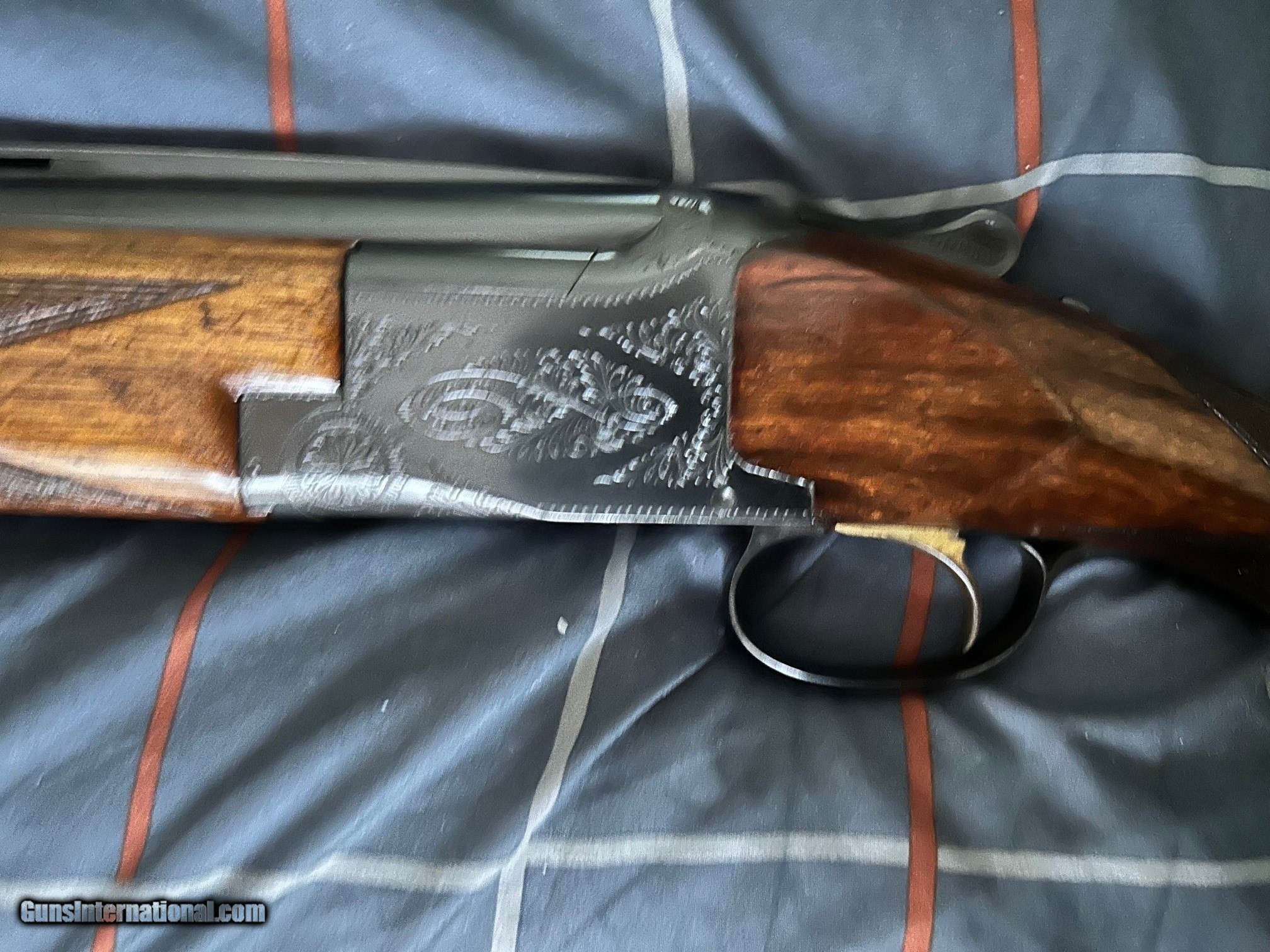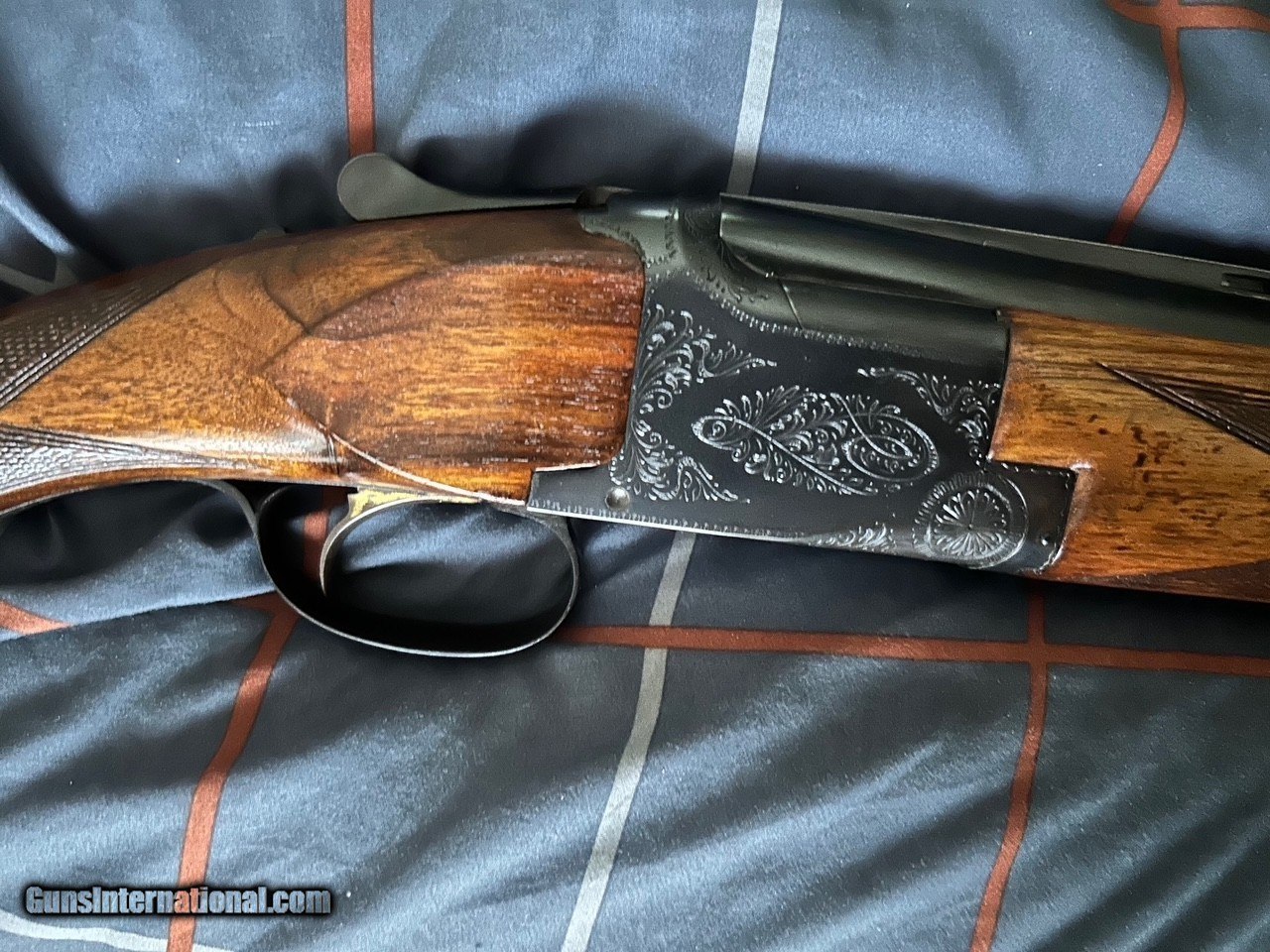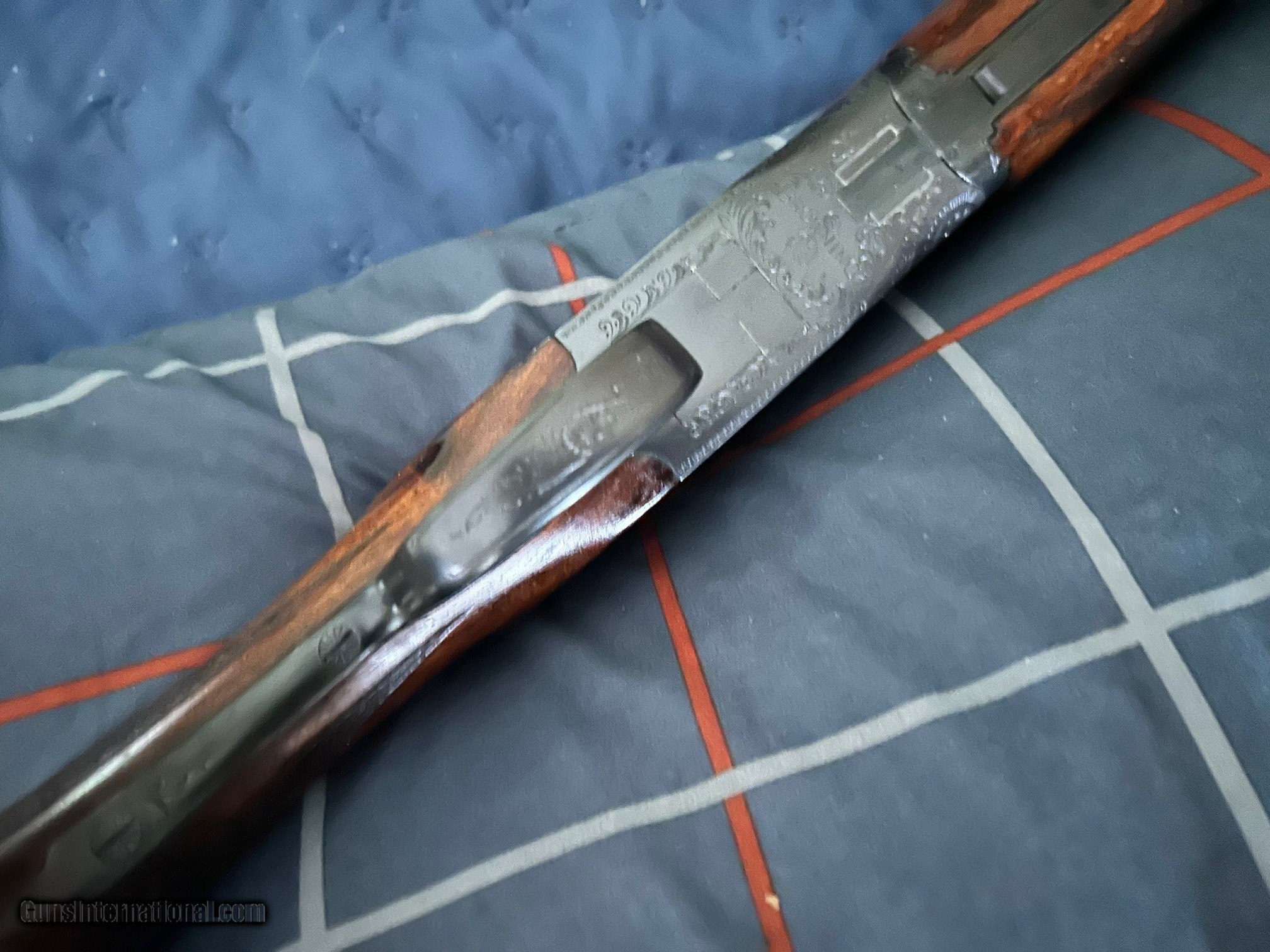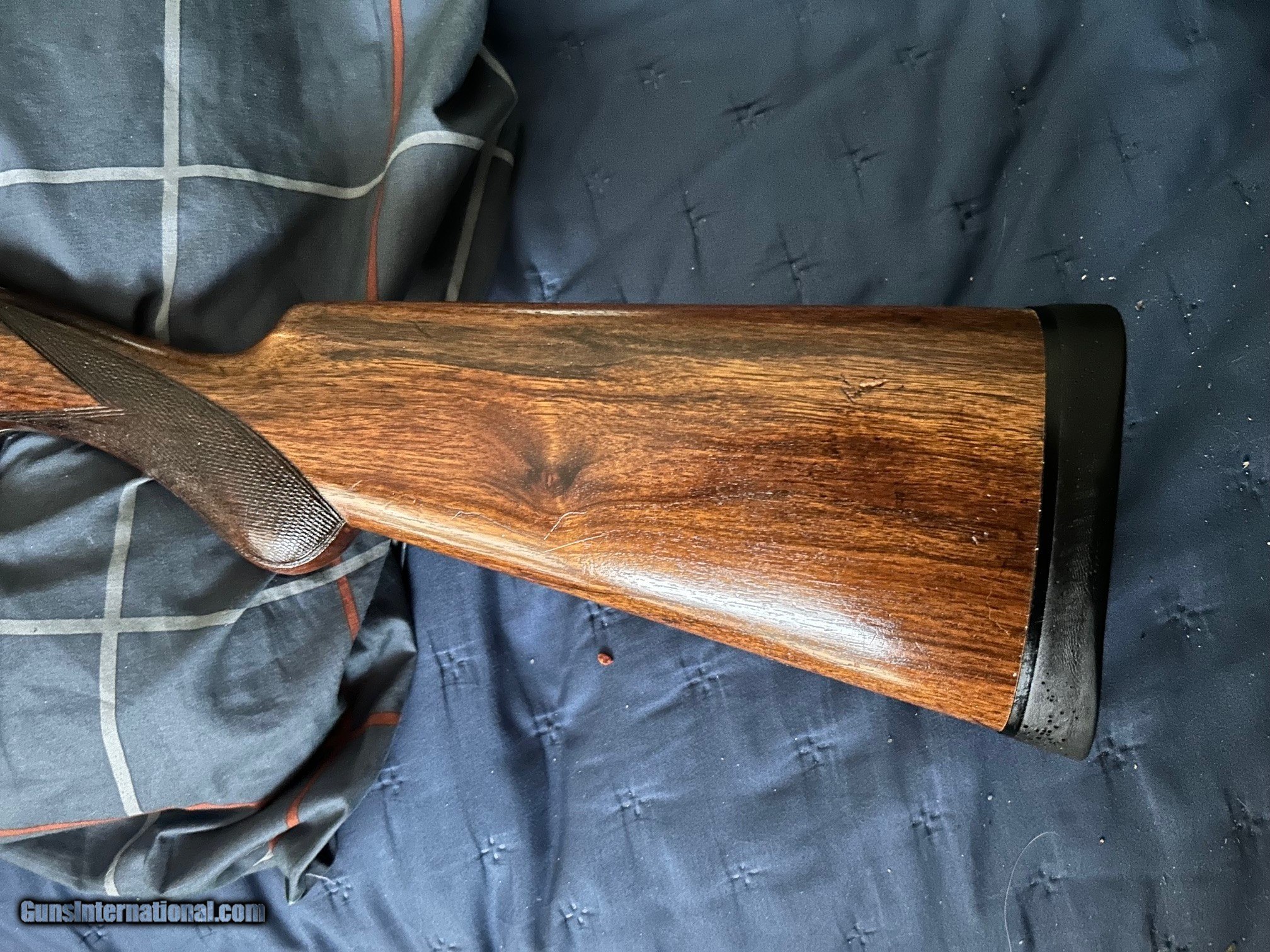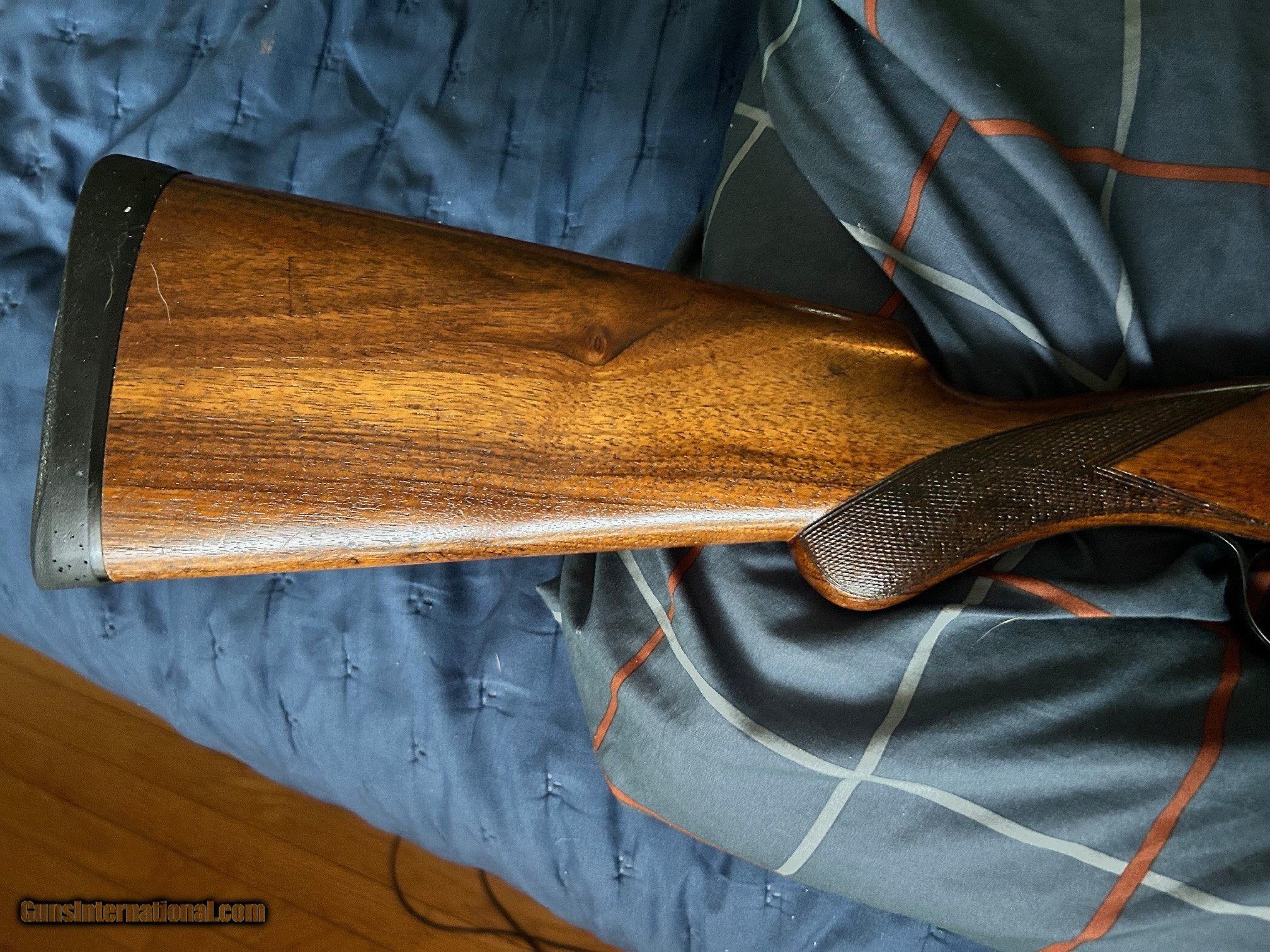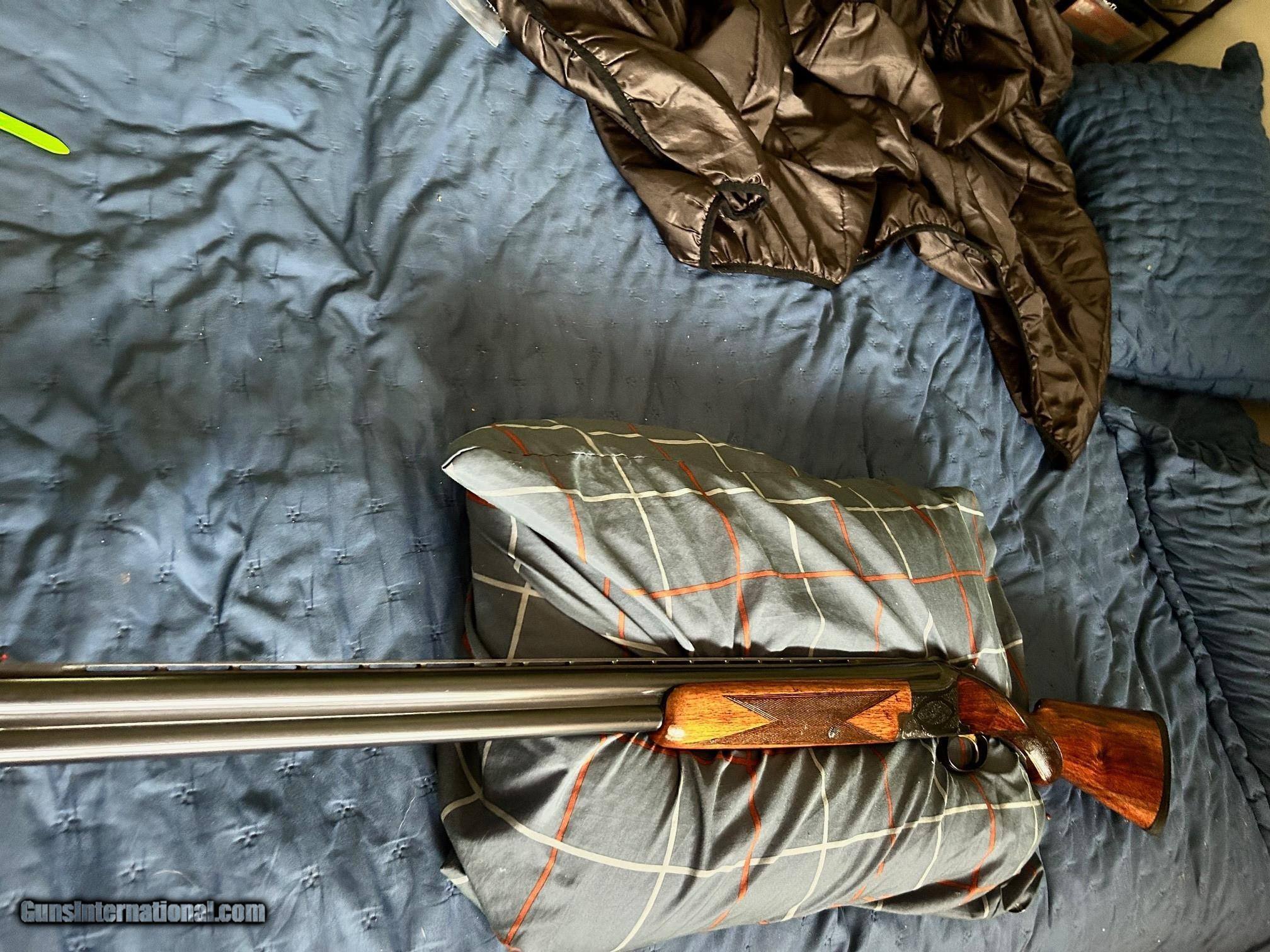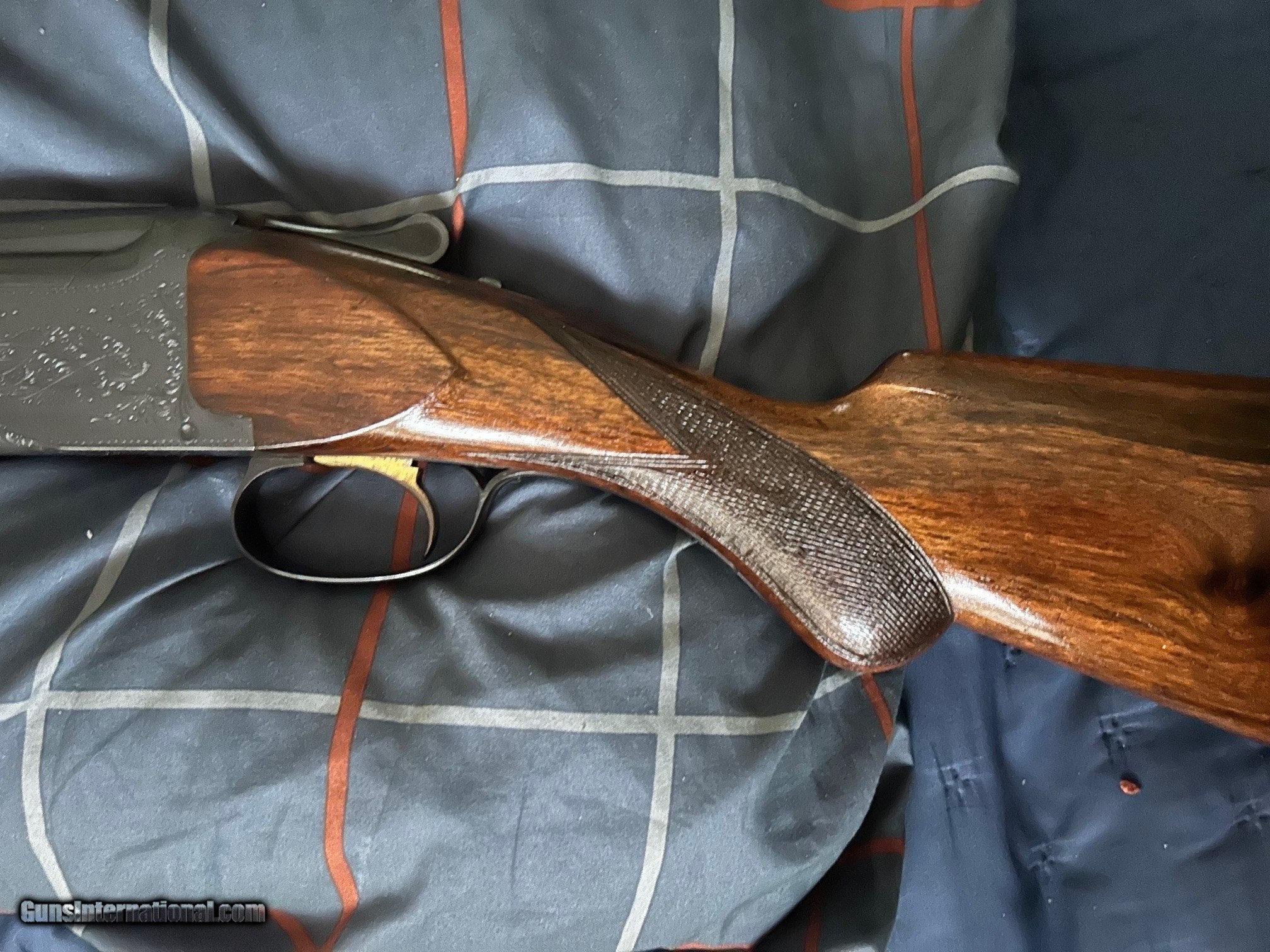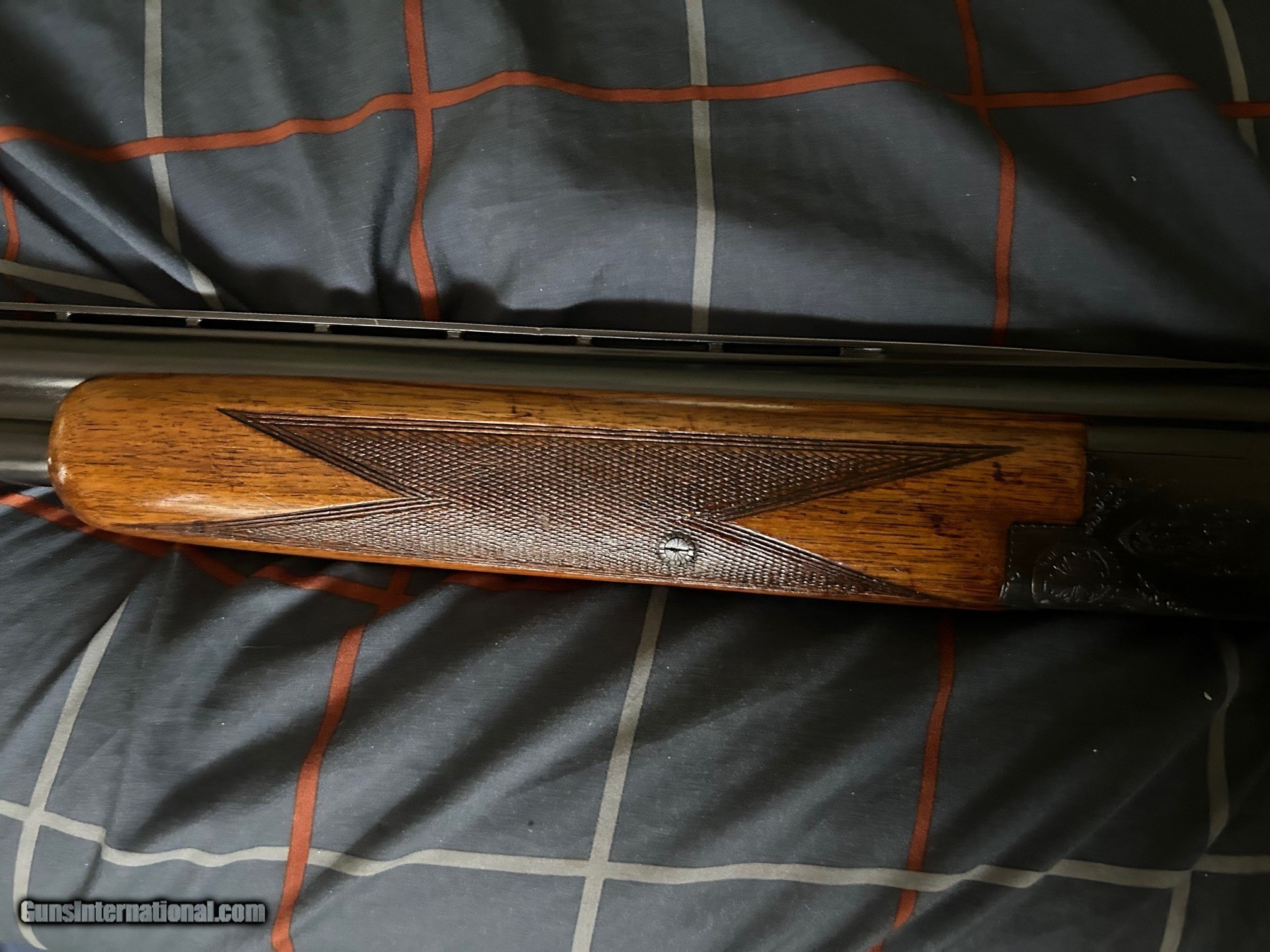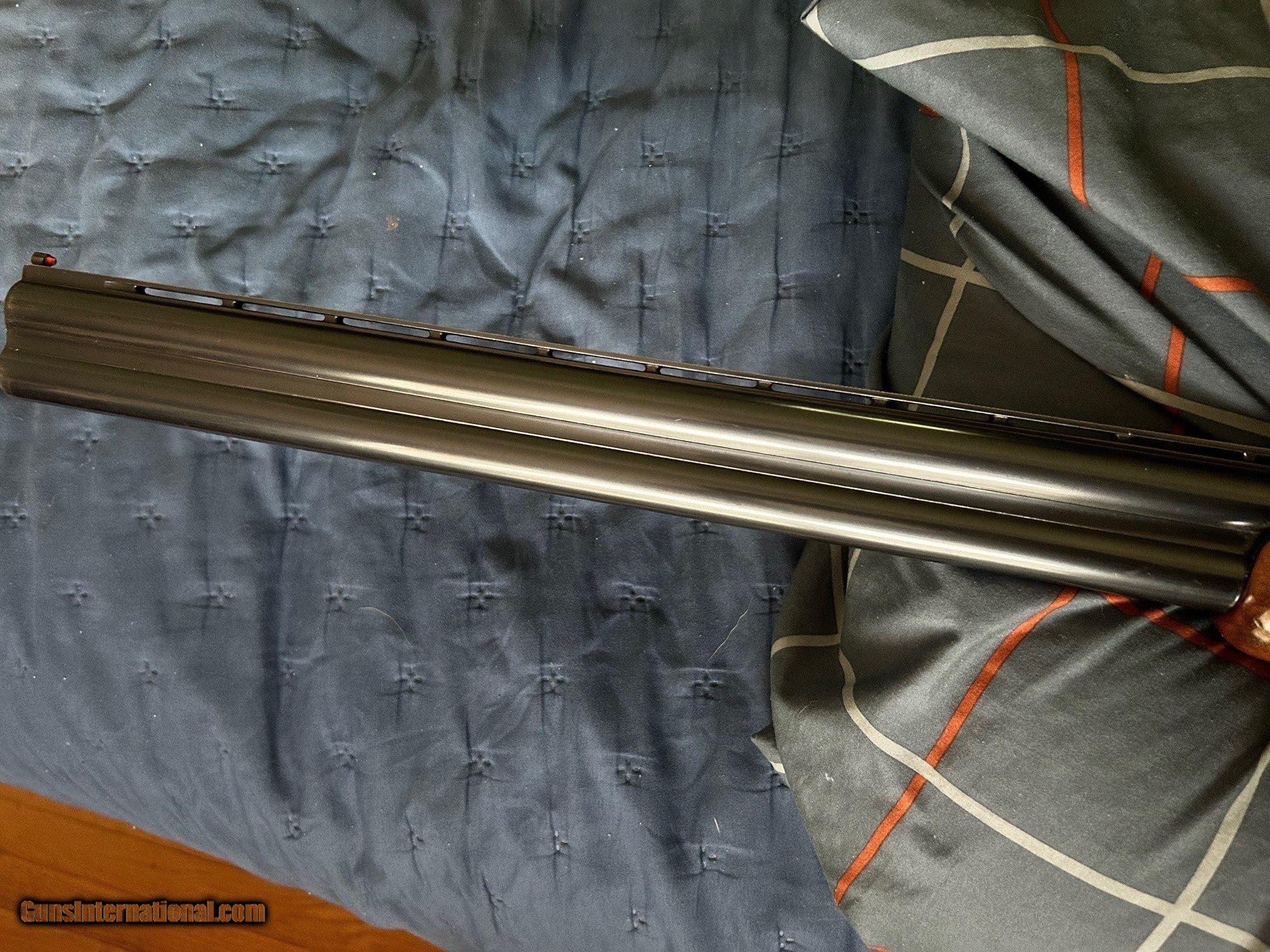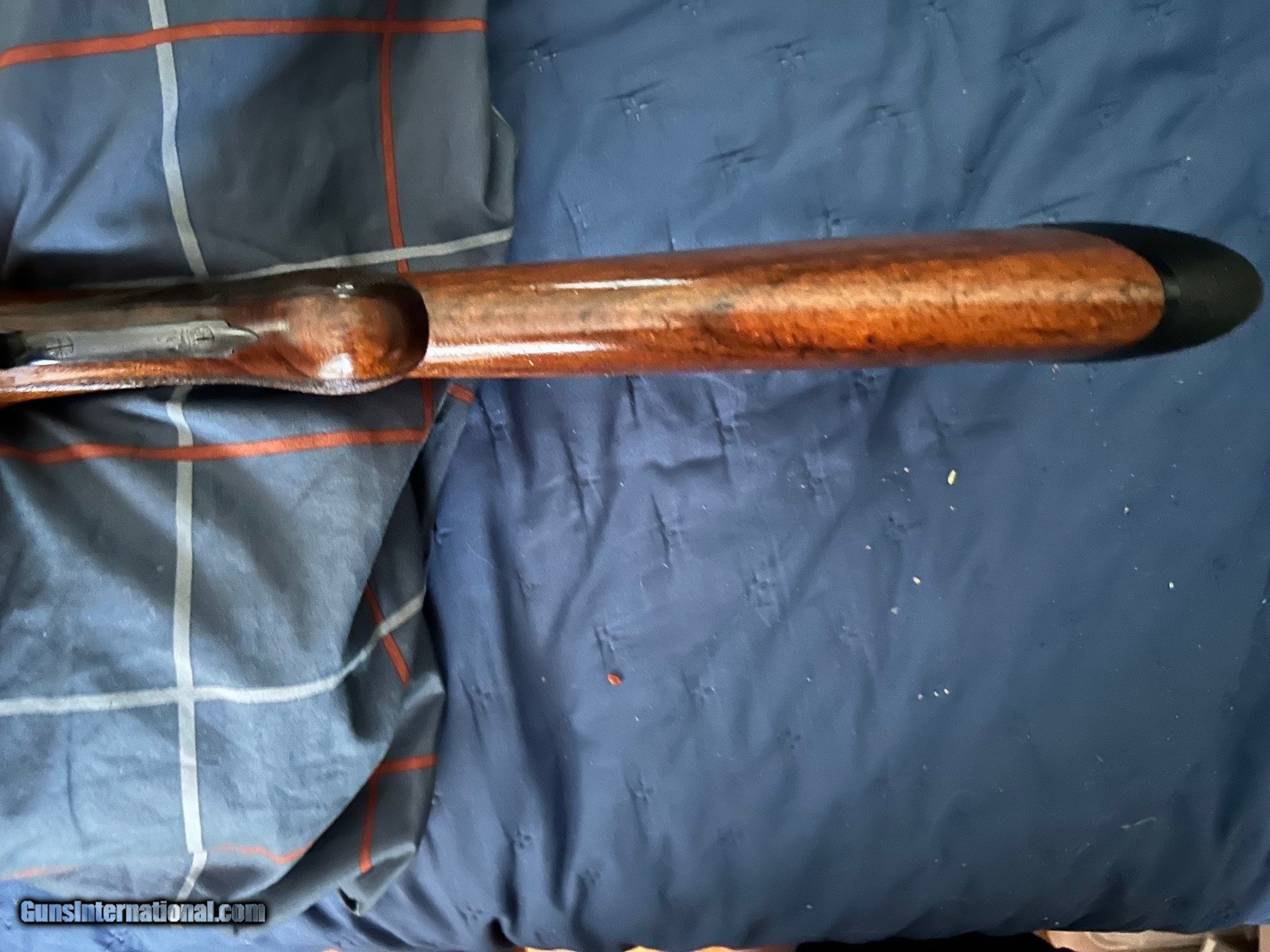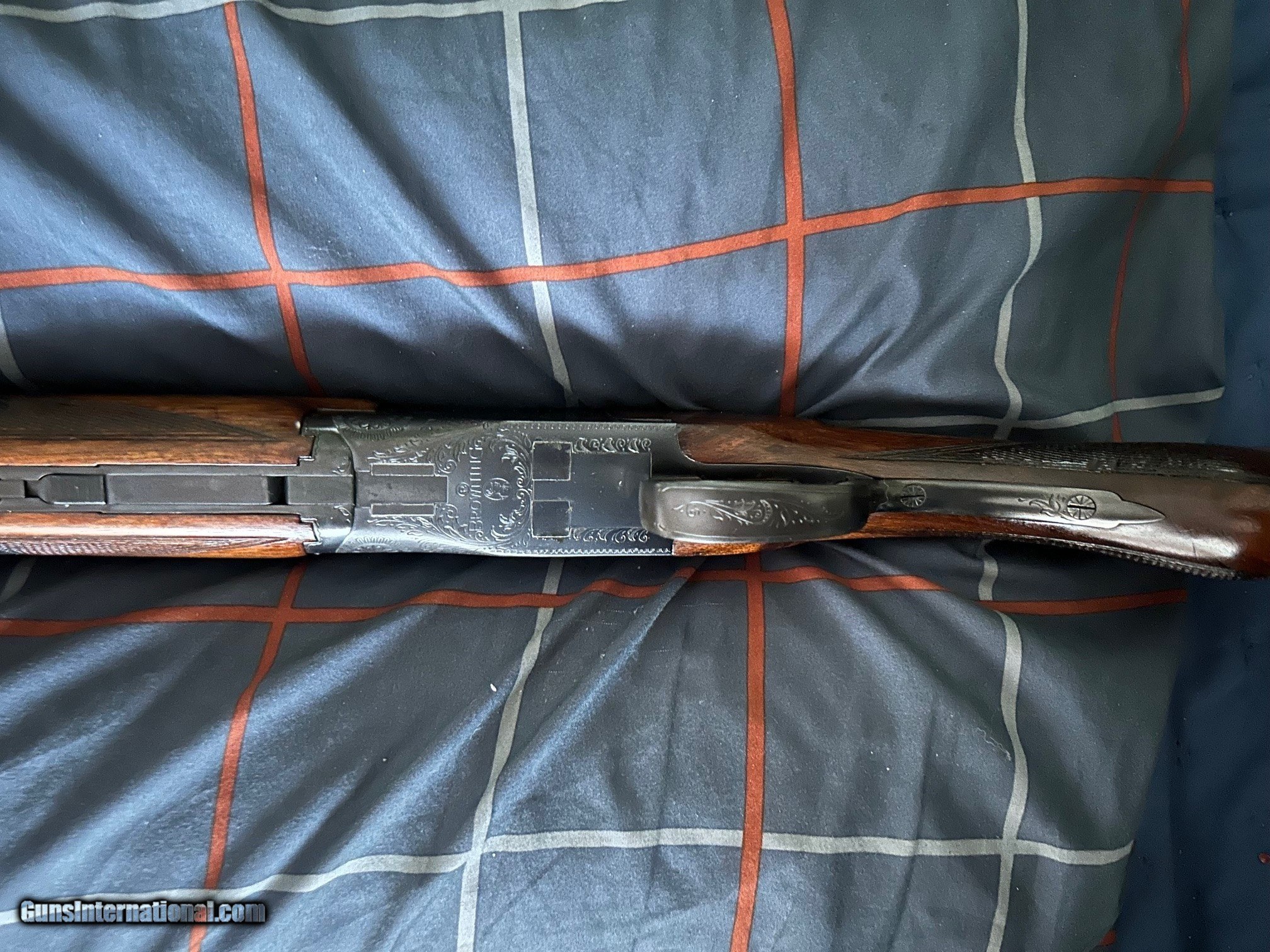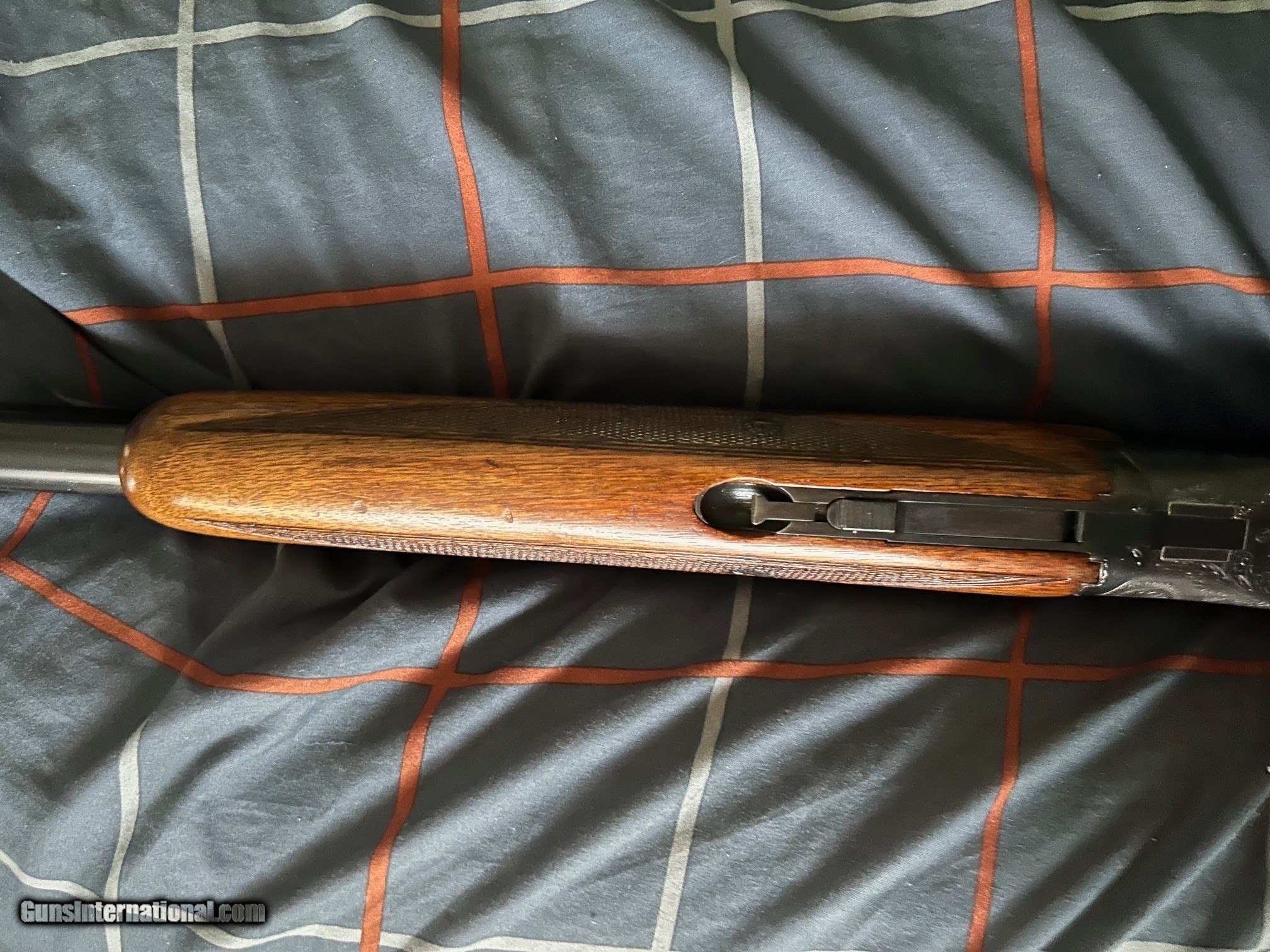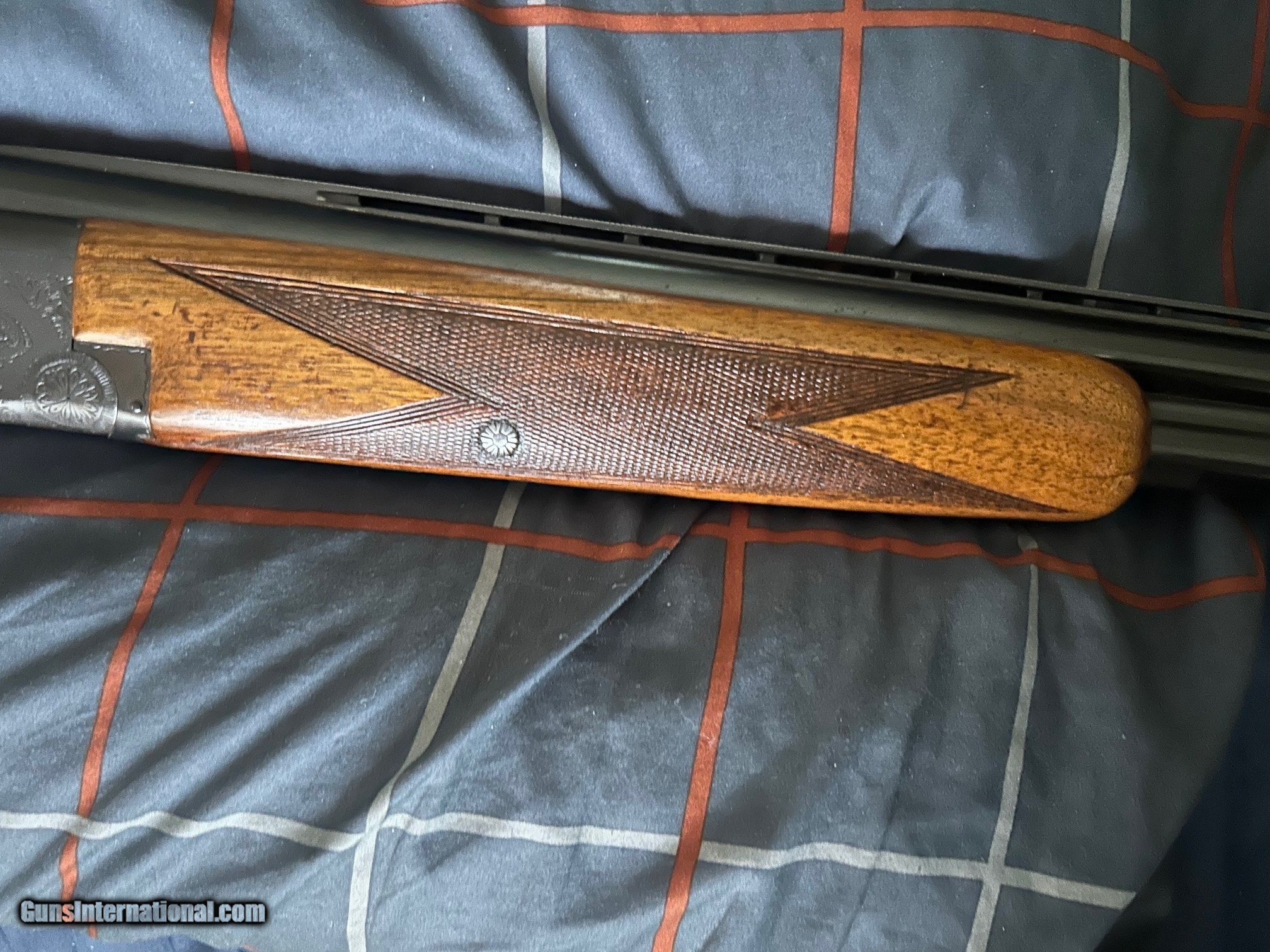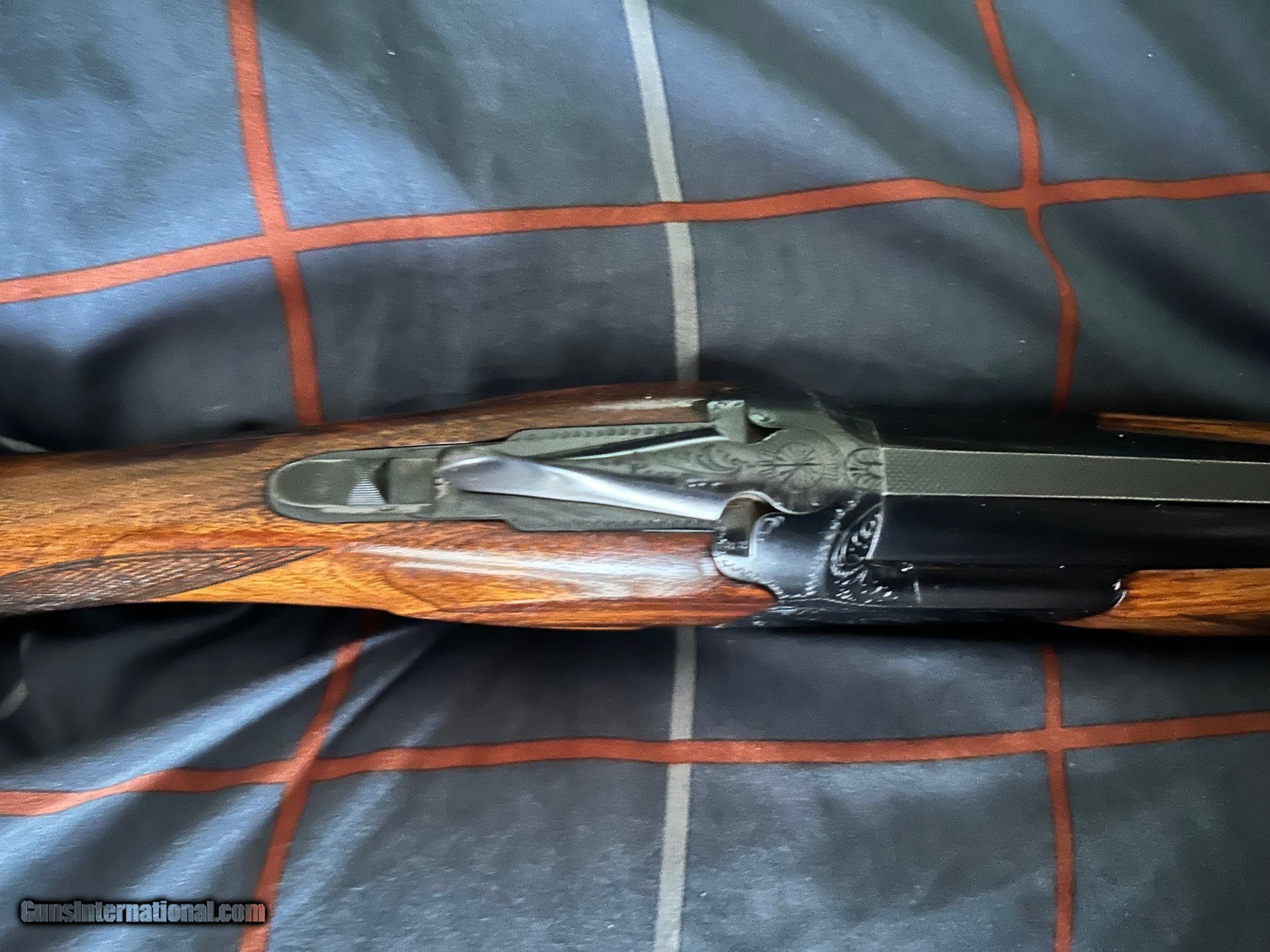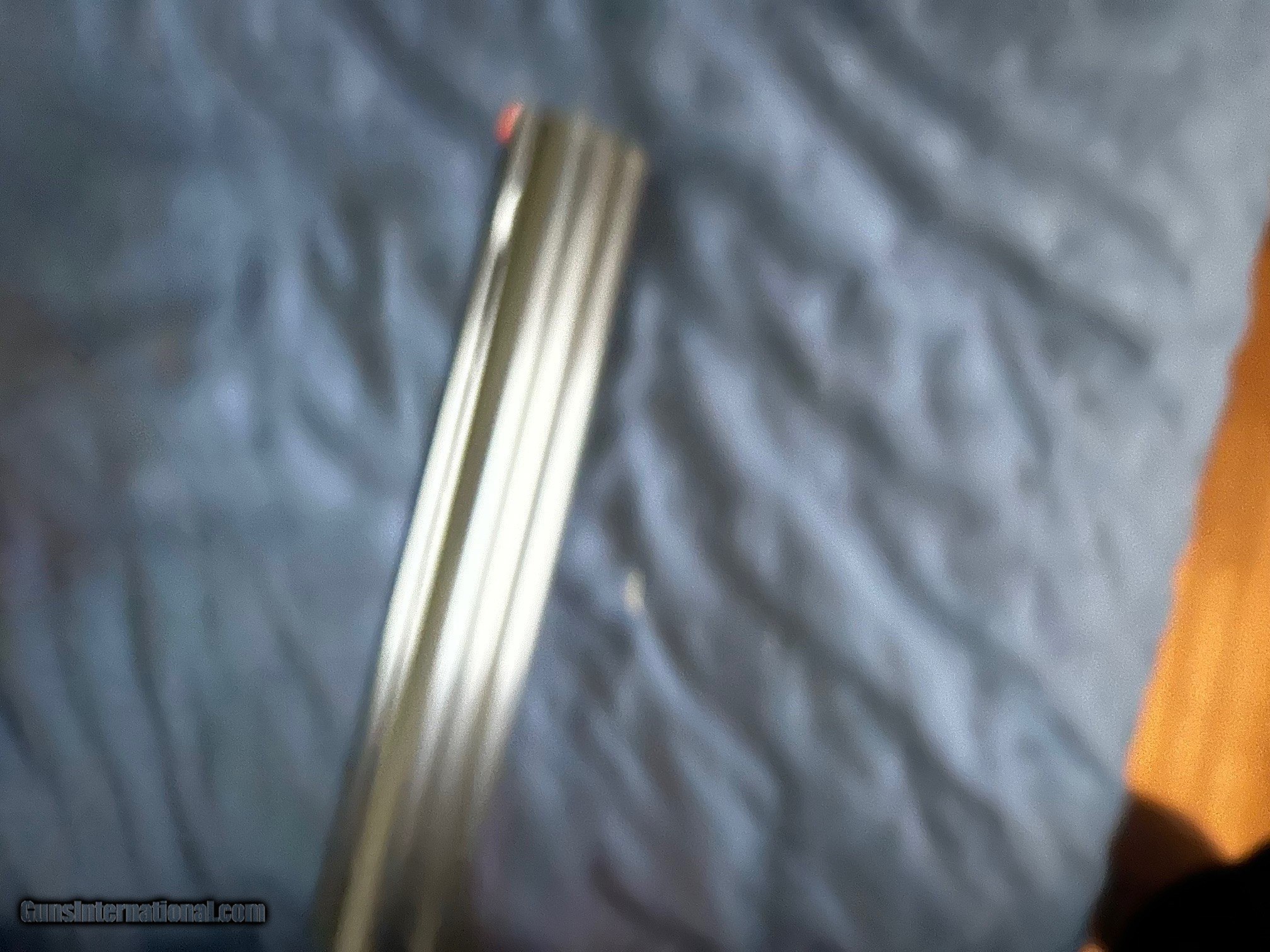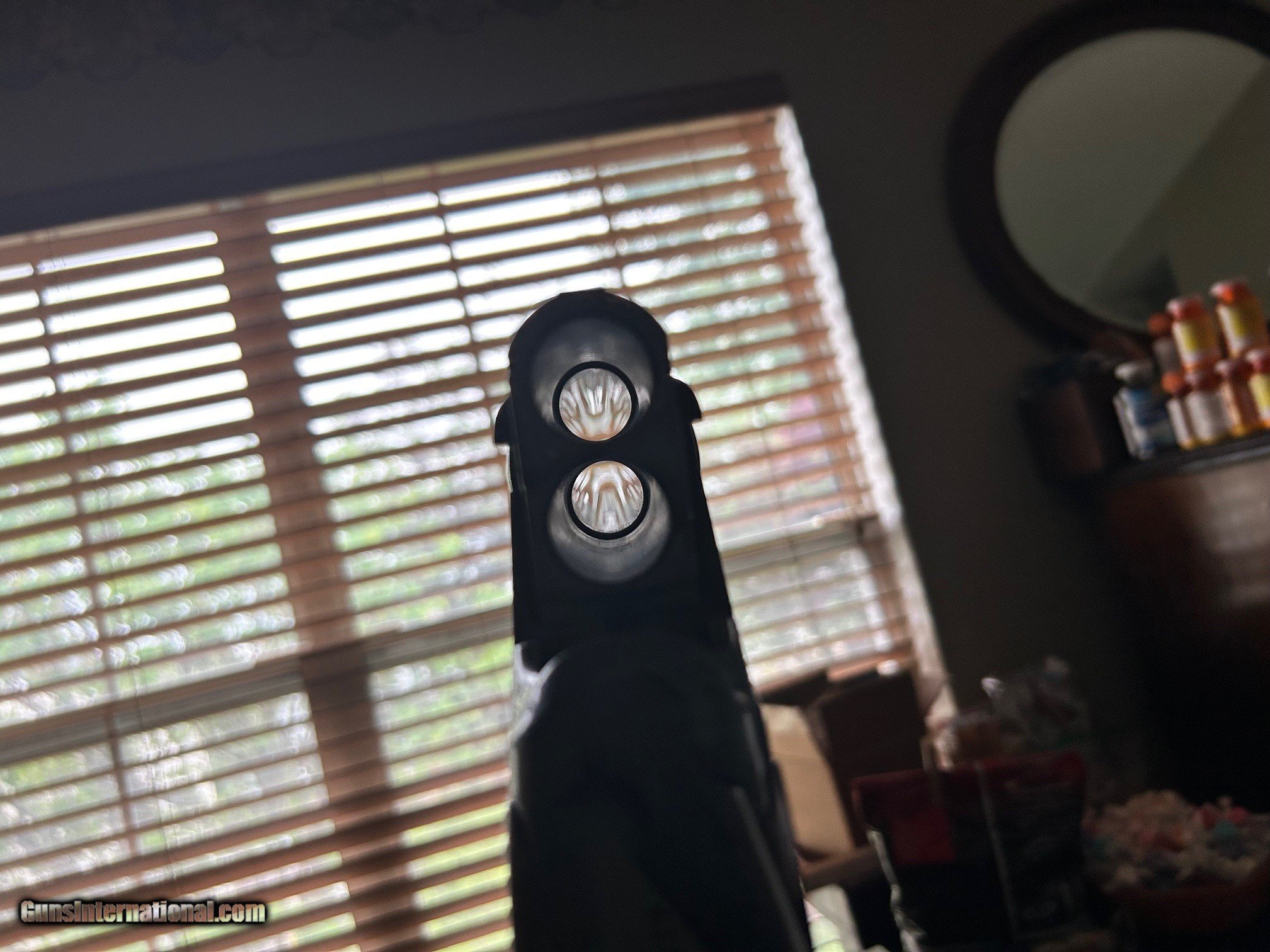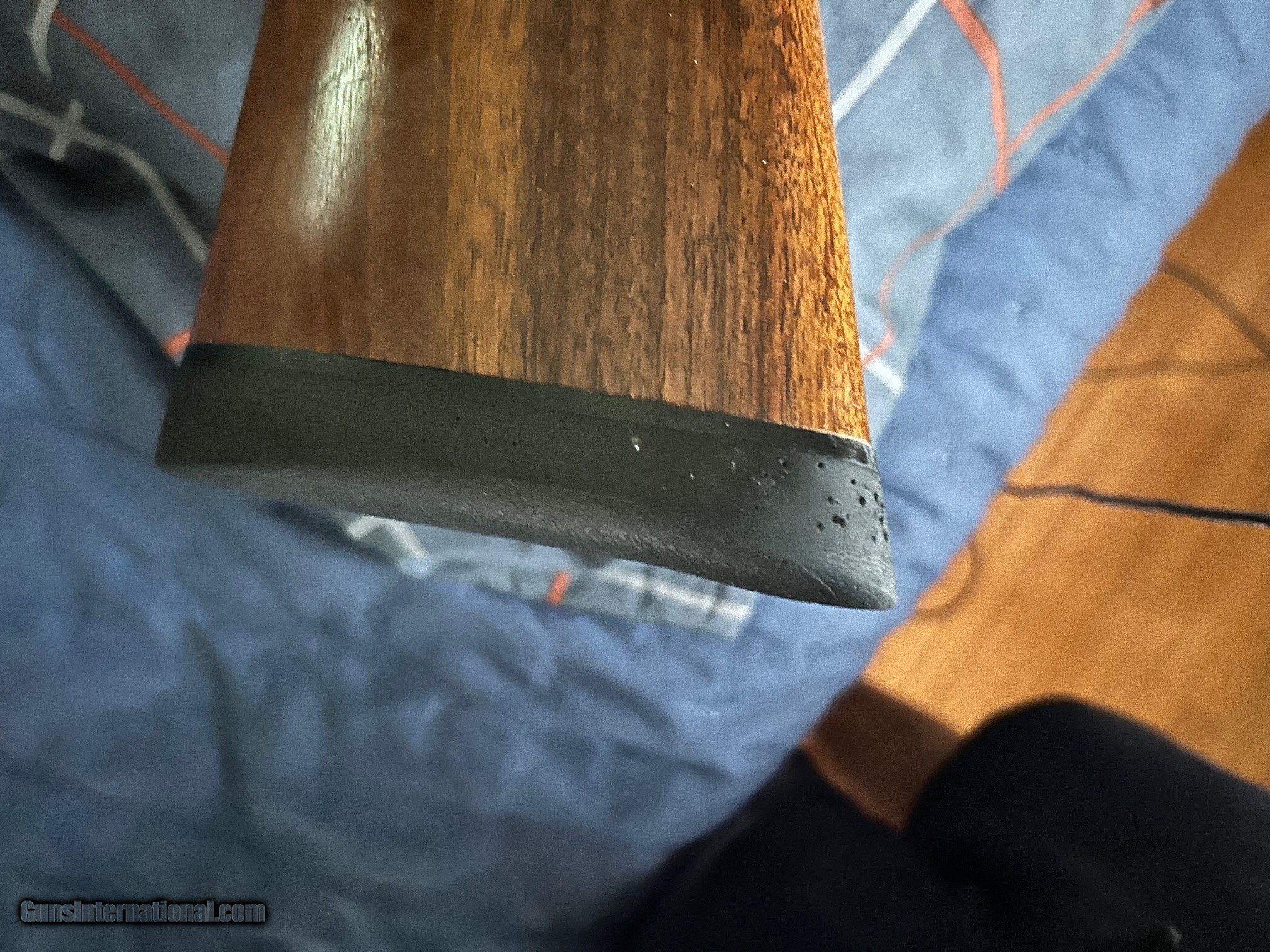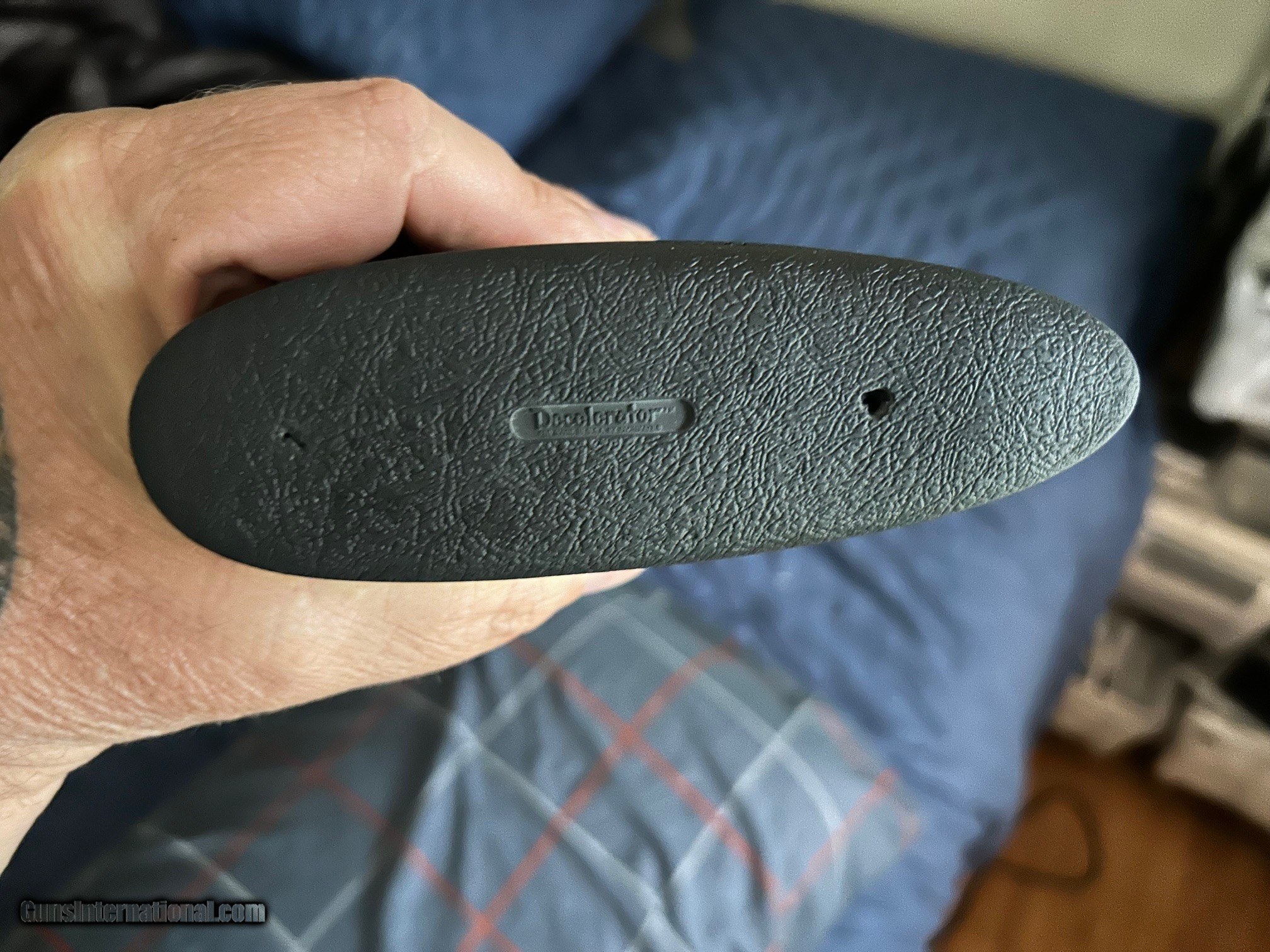Your Session is Ending
 The server has not detected any activity for the last 3 hours.
For your security, your session will expire in 2 minutes and you will be redirected to the Sign In page.
Would you like to stay signed in?
The server has not detected any activity for the last 3 hours.
For your security, your session will expire in 2 minutes and you will be redirected to the Sign In page.
Would you like to stay signed in?
1954 Browning Superposed 12 Gauge 28" Vented Barrel Fixed Full over Modified Chokes - VG+ Condition for sale
1954 Browning Superposed 12 Gauge 28" Vented Barrel Fixed Full over Modified Chokes - VG+ Condition for sale
Guns International #: 103108911
Seller's Inventory #: 404
1954 Browning Superposed 12 Gauge 28" Vented Barrel Fixed Full over Modified Chokes - VG+ Condition
Description:
Description
I purchased this gun from an old South Dakota bird hunter that hunted it since he purchased it in 1954. He took loving care of it, as you can tell by the condition of the gun. He is no longer able to hunt and has no one to pass it to. Own a piece of two histories.
Browning was making their finest firearms from the mid-50s to the mid-60s. Both the furniture and the metal are in very good condition. The gun is solid and is as smooth as butter. It has a new Deceleration pad and a LOP of 14.5". The barrels are vented and have fixed chokes, full over modified.
History of the Browning Superposed Over/Under
John M. Browning’s last design before his passing, the Browning Superposed, is a fine over/under shotgun that holds a good deal of collector value.
What makes the Browning Superposed a collectible item?
The side-by-side shotgun was still very popular at the time, but the over/under had never developed a large following in the U.S. Browning liked the over/under’s single sighting plane and was convinced American shooters would too, as the country was often called “a nation of riflemen.” The over/under was popular in Europe, where guns were custom-made and expensive.
Browning wasn’t just a great designer, but also a smart businessman. For this shotgun to be a success, he knew it needed the best workmanship possible for high-quantity production. His goal was a price under $150, much less than handmade European guns, but still a lot at a time when prices for many classic American side-by-sides were less than $50.
In the early ‘20s, Browning started on his Superposed shotgun. He was familiar with the various European designs and wanted to make improvements. It was a slow process, and it was 1926 before his design was finished and a patent was applied for and granted.
Browning had a long relationship with FN in Belgium. It had manufactured several of his designs and had agreed to produce the Superposed. In late 1926, he traveled to Liege with his son Val to work on the final details of his design, but he never lived to see it produced. On November 26, 1926, Browning died of an apparent heart attack in his office at FN.
There was still work to do before production of the Superposed could start, and Val Browning overtook the project. There were problems with several key features that needed to be addressed, including the trigger system, the selective automatic ejectors, and the fit and finish quality. Another was the unique fore-end system by which the barrels could be removed from the action without detaching the fore-end. These issues were resolved, and in 1931, the gun went into production. It was offered in four grades: standard or Grade 1, Pigeon, Diana, and Midas, each with higher levels of engraving and grades of wood. The Grade 1 base price was $107.50, with the higher grades ranging from $175 to $374.
The Grade 1 model had double triggers. For $137.50, the buyer had a choice of a single trigger (selective or non-selective) or a new design by Val Browning called the Twin-Single trigger. This system had two triggers, each of which was essentially a non-selective trigger firing one barrel with the first pull and the other with the second. The front trigger fired the lower barrel first, and the rear trigger fired the top barrel first.
The Twin-Single was clever and offered shooters a quick choice of chokes, depending on the distance and direction of a target. However, it was not a popular option with many shooters and was phased out when a new single-selective trigger was developed, again by Val Browning.
Another variation came along in 1936 with the Lightning Superposed. It weighed around 6.75 pounds, compared to 7.5 pounds for the 12-gauge.
The Superposed’s timing was not great. The Depression was well underway in 1931, and to remain competitive, in 1934, the base price was reduced to $99.50, and the next year to $69.75. The pre-war price stabilized at $79.80 until Germany invaded Belgium and took over the FN factory.
After World War II, FN returned to the manufacture of Browning sporting arms, first with the Auto-5 in 1946 and then the Superposed in 1948. The 12-gauge over/under was the same as the pre-war version but available only in Grade 1. It was priced much higher, at $241. Then, in 1949, the 20-gauge was introduced with a slimmer frame and a lighter weight of about 6.5 pounds. The ‘50s saw an expansion of Superposed variations, including magnum, trap, and skeet models. Some collectors consider the 1950s to be the period of the best quality for the Superposed.
In 1959, fans of the smaller gauges were thrilled when the .410 bore and 28-gauge models were introduced. For some reason, other than one prototype, no Superposed was ever chambered for the 16 gauge. Prices for Browning firearms saw big increases in the 60s, mostly due to labor problems in Belgium. By 1969, the Superposed Grade 1’s base price started at $435. To hold prices down, Browning made changes, mostly cosmetic. These included things like reducing the length of the trigger guard tang and the shape of the grip in 1966. Collector interest today is affected by these changes, with slightly higher values given for the “long tang, round knob” models.
In the '70s, inflation was a problem in much of the world, including Belgium. The Grade I price reached $1,100 by 1976. Browning had unveiled the made-in-Japan Citori in 1973, a well-made production gun priced at less than $400. The writing was on the wall. Browning executives realized that for the Superposed to continue at the same level of quality, it would need to become a presentation-grade, limited production item. In 1977, four grades were introduced, Presentation Models P1 to P4, with increasing levels of engraving, gold inlays, and wood quality. Prices ran from $3,000 to $6,000. The P-series Superposed remained in production until 1985. From the mid-80s until today, the Browning Custom Shop in Belgium has continued to build numerous variations of John Browning’s favorite creation.
This is a used item. While we do not test-fire our used firearms, we inspect and function-check them to ensure that they are fully functional to the best of our ability.
Layawy: 1/3 down 90 days
Shipping: $60, insurance extra upon Buyer's request
Payment: Personal Check, Money Order, Cert. Check, or Zelle
New shipping hard case $20 upon request
randywine2000yahoo
(703) 858-2881
Returns without damage or alteration within 3 days of delivery minus a 20% restocking fee
Curio/Relic: Yes
Shotgun Gauge: 12 Gauge
Manufacturer: Browning
Model: Superposed
Serial Number: 41272
Barrel Length: 28
Bore Info: Mirror Shine
Chambers: 2 3/4
Ejectors: Yes
Condition: VG+
Metal Condition: VG+
Wood Condition: VG+
Bore Condition: Excellent
Barrel Type: O/U
Action: Break
Triggers: Single Gold Plated
Stock: Black Walnut
Butt Pad: Decelerator
LOP: 14.5
Rib: Vented
Finish: Hand Rubbed Oil Gloss
Weight: 6.75lbs
Manufacture Date: 1954
Chokes: Fixed Full over Modified
Engraving: Factory
Case: Optional
Grips: Checkered Pistol
Price: $1,499.00
Buy Now
Description:
Description
I purchased this gun from an old South Dakota bird hunter that hunted it since he purchased it in 1954. He took loving care of it, as you can tell by the condition of the gun. He is no longer able to hunt and has no one to pass it to. Own a piece of two histories.
Browning was making their finest firearms from the mid-50s to the mid-60s. Both the furniture and the metal are in very good condition. The gun is solid and is as smooth as butter. It has a new Deceleration pad and a LOP of 14.5". The barrels are vented and have fixed chokes, full over modified.
History of the Browning Superposed Over/Under
John M. Browning’s last design before his passing, the Browning Superposed, is a fine over/under shotgun that holds a good deal of collector value.
What makes the Browning Superposed a collectible item?
- The Superposed was John Browning's final design before his passing in 1926.
- There are several different variations and grades of the Superposed.
- The higher-grade Superposed models sport classy engravings and fine wood.
- During the '70s, production was cut back, and the Superposed became a limited production model.
- Since the mid-'80s, the Superposed has only been offered as a custom shop item.
The side-by-side shotgun was still very popular at the time, but the over/under had never developed a large following in the U.S. Browning liked the over/under’s single sighting plane and was convinced American shooters would too, as the country was often called “a nation of riflemen.” The over/under was popular in Europe, where guns were custom-made and expensive.
Browning wasn’t just a great designer, but also a smart businessman. For this shotgun to be a success, he knew it needed the best workmanship possible for high-quantity production. His goal was a price under $150, much less than handmade European guns, but still a lot at a time when prices for many classic American side-by-sides were less than $50.
In the early ‘20s, Browning started on his Superposed shotgun. He was familiar with the various European designs and wanted to make improvements. It was a slow process, and it was 1926 before his design was finished and a patent was applied for and granted.
Browning had a long relationship with FN in Belgium. It had manufactured several of his designs and had agreed to produce the Superposed. In late 1926, he traveled to Liege with his son Val to work on the final details of his design, but he never lived to see it produced. On November 26, 1926, Browning died of an apparent heart attack in his office at FN.
There was still work to do before production of the Superposed could start, and Val Browning overtook the project. There were problems with several key features that needed to be addressed, including the trigger system, the selective automatic ejectors, and the fit and finish quality. Another was the unique fore-end system by which the barrels could be removed from the action without detaching the fore-end. These issues were resolved, and in 1931, the gun went into production. It was offered in four grades: standard or Grade 1, Pigeon, Diana, and Midas, each with higher levels of engraving and grades of wood. The Grade 1 base price was $107.50, with the higher grades ranging from $175 to $374.
The Grade 1 model had double triggers. For $137.50, the buyer had a choice of a single trigger (selective or non-selective) or a new design by Val Browning called the Twin-Single trigger. This system had two triggers, each of which was essentially a non-selective trigger firing one barrel with the first pull and the other with the second. The front trigger fired the lower barrel first, and the rear trigger fired the top barrel first.
The Twin-Single was clever and offered shooters a quick choice of chokes, depending on the distance and direction of a target. However, it was not a popular option with many shooters and was phased out when a new single-selective trigger was developed, again by Val Browning.
Another variation came along in 1936 with the Lightning Superposed. It weighed around 6.75 pounds, compared to 7.5 pounds for the 12-gauge.
The Superposed’s timing was not great. The Depression was well underway in 1931, and to remain competitive, in 1934, the base price was reduced to $99.50, and the next year to $69.75. The pre-war price stabilized at $79.80 until Germany invaded Belgium and took over the FN factory.
After World War II, FN returned to the manufacture of Browning sporting arms, first with the Auto-5 in 1946 and then the Superposed in 1948. The 12-gauge over/under was the same as the pre-war version but available only in Grade 1. It was priced much higher, at $241. Then, in 1949, the 20-gauge was introduced with a slimmer frame and a lighter weight of about 6.5 pounds. The ‘50s saw an expansion of Superposed variations, including magnum, trap, and skeet models. Some collectors consider the 1950s to be the period of the best quality for the Superposed.
In 1959, fans of the smaller gauges were thrilled when the .410 bore and 28-gauge models were introduced. For some reason, other than one prototype, no Superposed was ever chambered for the 16 gauge. Prices for Browning firearms saw big increases in the 60s, mostly due to labor problems in Belgium. By 1969, the Superposed Grade 1’s base price started at $435. To hold prices down, Browning made changes, mostly cosmetic. These included things like reducing the length of the trigger guard tang and the shape of the grip in 1966. Collector interest today is affected by these changes, with slightly higher values given for the “long tang, round knob” models.
In the '70s, inflation was a problem in much of the world, including Belgium. The Grade I price reached $1,100 by 1976. Browning had unveiled the made-in-Japan Citori in 1973, a well-made production gun priced at less than $400. The writing was on the wall. Browning executives realized that for the Superposed to continue at the same level of quality, it would need to become a presentation-grade, limited production item. In 1977, four grades were introduced, Presentation Models P1 to P4, with increasing levels of engraving, gold inlays, and wood quality. Prices ran from $3,000 to $6,000. The P-series Superposed remained in production until 1985. From the mid-80s until today, the Browning Custom Shop in Belgium has continued to build numerous variations of John Browning’s favorite creation.
This is a used item. While we do not test-fire our used firearms, we inspect and function-check them to ensure that they are fully functional to the best of our ability.
Layawy: 1/3 down 90 days
Shipping: $60, insurance extra upon Buyer's request
Payment: Personal Check, Money Order, Cert. Check, or Zelle
New shipping hard case $20 upon request
randywine2000yahoo
(703) 858-2881
Returns without damage or alteration within 3 days of delivery minus a 20% restocking fee
Curio/Relic: Yes
Shotgun Gauge: 12 Gauge
Manufacturer: Browning
Model: Superposed
Serial Number: 41272
Barrel Length: 28
Bore Info: Mirror Shine
Chambers: 2 3/4
Ejectors: Yes
Condition: VG+
Metal Condition: VG+
Wood Condition: VG+
Bore Condition: Excellent
Barrel Type: O/U
Action: Break
Triggers: Single Gold Plated
Stock: Black Walnut
Butt Pad: Decelerator
LOP: 14.5
Rib: Vented
Finish: Hand Rubbed Oil Gloss
Weight: 6.75lbs
Manufacture Date: 1954
Chokes: Fixed Full over Modified
Engraving: Factory
Case: Optional
Grips: Checkered Pistol
Price: $1,499.00
Buy Now
Contact Seller
Click Photo to Enlarge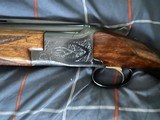
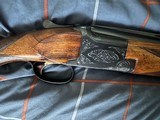
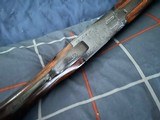
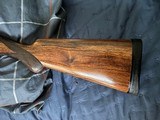
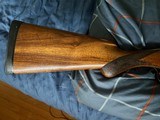
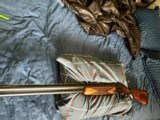
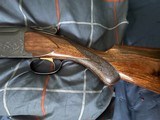
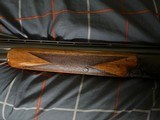
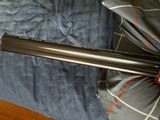
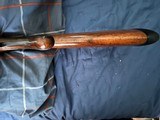
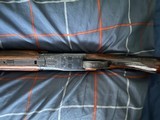
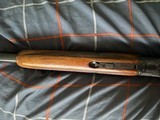
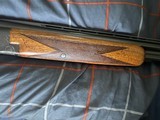
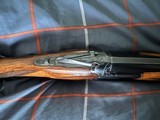
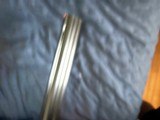
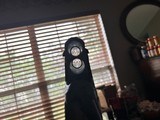
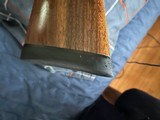
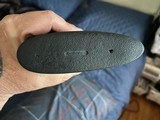
|
Guns International #: 103108911
1954 Browning Superposed 12 Gauge 28" Vented Barrel Fixed Full over Modified Chokes - VG+ Condition
Description: Description I purchased this gun from an old South Dakota bird hunter that hunted it since he purchased it in 1954. He took loving care of it, as you can tell by the condition of the gun. He is no longer able to hunt and has no one to pass it to. Own a piece of two histories. Browning was making their finest firearms from the mid-50s to the mid-60s. Both the furniture and the metal are in very good condition. The gun is solid and is as smooth as butter. It has a new Deceleration pad and a LOP of 14.5". The barrels are vented and have fixed chokes, full over modified. History of the Browning Superposed Over/Under John M. Browning’s last design before his passing, the Browning Superposed, is a fine over/under shotgun that holds a good deal of collector value. What makes the Browning Superposed a collectible item?
The side-by-side shotgun was still very popular at the time, but the over/under had never developed a large following in the U.S. Browning liked the over/under’s single sighting plane and was convinced American shooters would too, as the country was often called “a nation of riflemen.” The over/under was popular in Europe, where guns were custom-made and expensive. Browning wasn’t just a great designer, but also a smart businessman. For this shotgun to be a success, he knew it needed the best workmanship possible for high-quantity production. His goal was a price under $150, much less than handmade European guns, but still a lot at a time when prices for many classic American side-by-sides were less than $50. In the early ‘20s, Browning started on his Superposed shotgun. He was familiar with the various European designs and wanted to make improvements. It was a slow process, and it was 1926 before his design was finished and a patent was applied for and granted. Browning had a long relationship with FN in Belgium. It had manufactured several of his designs and had agreed to produce the Superposed. In late 1926, he traveled to Liege with his son Val to work on the final details of his design, but he never lived to see it produced. On November 26, 1926, Browning died of an apparent heart attack in his office at FN. There was still work to do before production of the Superposed could start, and Val Browning overtook the project. There were problems with several key features that needed to be addressed, including the trigger system, the selective automatic ejectors, and the fit and finish quality. Another was the unique fore-end system by which the barrels could be removed from the action without detaching the fore-end. These issues were resolved, and in 1931, the gun went into production. It was offered in four grades: standard or Grade 1, Pigeon, Diana, and Midas, each with higher levels of engraving and grades of wood. The Grade 1 base price was $107.50, with the higher grades ranging from $175 to $374. The Grade 1 model had double triggers. For $137.50, the buyer had a choice of a single trigger (selective or non-selective) or a new design by Val Browning called the Twin-Single trigger. This system had two triggers, each of which was essentially a non-selective trigger firing one barrel with the first pull and the other with the second. The front trigger fired the lower barrel first, and the rear trigger fired the top barrel first. The Twin-Single was clever and offered shooters a quick choice of chokes, depending on the distance and direction of a target. However, it was not a popular option with many shooters and was phased out when a new single-selective trigger was developed, again by Val Browning. Another variation came along in 1936 with the Lightning Superposed. It weighed around 6.75 pounds, compared to 7.5 pounds for the 12-gauge. The Superposed’s timing was not great. The Depression was well underway in 1931, and to remain competitive, in 1934, the base price was reduced to $99.50, and the next year to $69.75. The pre-war price stabilized at $79.80 until Germany invaded Belgium and took over the FN factory. After World War II, FN returned to the manufacture of Browning sporting arms, first with the Auto-5 in 1946 and then the Superposed in 1948. The 12-gauge over/under was the same as the pre-war version but available only in Grade 1. It was priced much higher, at $241. Then, in 1949, the 20-gauge was introduced with a slimmer frame and a lighter weight of about 6.5 pounds. The ‘50s saw an expansion of Superposed variations, including magnum, trap, and skeet models. Some collectors consider the 1950s to be the period of the best quality for the Superposed. In 1959, fans of the smaller gauges were thrilled when the .410 bore and 28-gauge models were introduced. For some reason, other than one prototype, no Superposed was ever chambered for the 16 gauge. Prices for Browning firearms saw big increases in the 60s, mostly due to labor problems in Belgium. By 1969, the Superposed Grade 1’s base price started at $435. To hold prices down, Browning made changes, mostly cosmetic. These included things like reducing the length of the trigger guard tang and the shape of the grip in 1966. Collector interest today is affected by these changes, with slightly higher values given for the “long tang, round knob” models. In the '70s, inflation was a problem in much of the world, including Belgium. The Grade I price reached $1,100 by 1976. Browning had unveiled the made-in-Japan Citori in 1973, a well-made production gun priced at less than $400. The writing was on the wall. Browning executives realized that for the Superposed to continue at the same level of quality, it would need to become a presentation-grade, limited production item. In 1977, four grades were introduced, Presentation Models P1 to P4, with increasing levels of engraving, gold inlays, and wood quality. Prices ran from $3,000 to $6,000. The P-series Superposed remained in production until 1985. From the mid-80s until today, the Browning Custom Shop in Belgium has continued to build numerous variations of John Browning’s favorite creation. This is a used item. While we do not test-fire our used firearms, we inspect and function-check them to ensure that they are fully functional to the best of our ability. Layawy: 1/3 down 90 days Shipping: $60, insurance extra upon Buyer's request Payment: Personal Check, Money Order, Cert. Check, or Zelle New shipping hard case $20 upon request randywine2000yahoo (703) 858-2881 Returns without damage or alteration within 3 days of delivery minus a 20% restocking fee Curio/Relic: Yes Shotgun Gauge: 12 Gauge Manufacturer: Browning Model: Superposed Serial Number: 41272 Barrel Length: 28 Bore Info: Mirror Shine Chambers: 2 3/4 Ejectors: Yes Condition: VG+ Metal Condition: VG+ Wood Condition: VG+ Bore Condition: Excellent Barrel Type: O/U Action: Break Triggers: Single Gold Plated Stock: Black Walnut Butt Pad: Decelerator LOP: 14.5 Rib: Vented Finish: Hand Rubbed Oil Gloss Weight: 6.75lbs Manufacture Date: 1954 Chokes: Fixed Full over Modified Engraving: Factory Case: Optional Grips: Checkered Pistol Price: $1,499.00 Buy Now Contact Seller |
Guns International #: 103108911
Seller's Inventory #: 404
1954 Browning Superposed 12 Gauge 28" Vented Barrel Fixed Full over Modified Chokes - VG+ Condition
Description:
Description
I purchased this gun from an old South Dakota bird hunter that hunted it since he purchased it in 1954. He took loving care of it, as you can tell by the condition of the gun. He is no longer able to hunt and has no one to pass it to. Own a piece of two histories.
Browning was making their finest firearms from the mid-50s to the mid-60s. Both the furniture and the metal are in very good condition. The gun is solid and is as smooth as butter. It has a new Deceleration pad and a LOP of 14.5". The barrels are vented and have fixed chokes, full over modified.
History of the Browning Superposed Over/Under
John M. Browning’s last design before his passing, the Browning Superposed, is a fine over/under shotgun that holds a good deal of collector value.
What makes the Browning Superposed a collectible item?
The side-by-side shotgun was still very popular at the time, but the over/under had never developed a large following in the U.S. Browning liked the over/under’s single sighting plane and was convinced American shooters would too, as the country was often called “a nation of riflemen.” The over/under was popular in Europe, where guns were custom-made and expensive.
Browning wasn’t just a great designer, but also a smart businessman. For this shotgun to be a success, he knew it needed the best workmanship possible for high-quantity production. His goal was a price under $150, much less than handmade European guns, but still a lot at a time when prices for many classic American side-by-sides were less than $50.
In the early ‘20s, Browning started on his Superposed shotgun. He was familiar with the various European designs and wanted to make improvements. It was a slow process, and it was 1926 before his design was finished and a patent was applied for and granted.
Browning had a long relationship with FN in Belgium. It had manufactured several of his designs and had agreed to produce the Superposed. In late 1926, he traveled to Liege with his son Val to work on the final details of his design, but he never lived to see it produced. On November 26, 1926, Browning died of an apparent heart attack in his office at FN.
There was still work to do before production of the Superposed could start, and Val Browning overtook the project. There were problems with several key features that needed to be addressed, including the trigger system, the selective automatic ejectors, and the fit and finish quality. Another was the unique fore-end system by which the barrels could be removed from the action without detaching the fore-end. These issues were resolved, and in 1931, the gun went into production. It was offered in four grades: standard or Grade 1, Pigeon, Diana, and Midas, each with higher levels of engraving and grades of wood. The Grade 1 base price was $107.50, with the higher grades ranging from $175 to $374.
The Grade 1 model had double triggers. For $137.50, the buyer had a choice of a single trigger (selective or non-selective) or a new design by Val Browning called the Twin-Single trigger. This system had two triggers, each of which was essentially a non-selective trigger firing one barrel with the first pull and the other with the second. The front trigger fired the lower barrel first, and the rear trigger fired the top barrel first.
The Twin-Single was clever and offered shooters a quick choice of chokes, depending on the distance and direction of a target. However, it was not a popular option with many shooters and was phased out when a new single-selective trigger was developed, again by Val Browning.
Another variation came along in 1936 with the Lightning Superposed. It weighed around 6.75 pounds, compared to 7.5 pounds for the 12-gauge.
The Superposed’s timing was not great. The Depression was well underway in 1931, and to remain competitive, in 1934, the base price was reduced to $99.50, and the next year to $69.75. The pre-war price stabilized at $79.80 until Germany invaded Belgium and took over the FN factory.
After World War II, FN returned to the manufacture of Browning sporting arms, first with the Auto-5 in 1946 and then the Superposed in 1948. The 12-gauge over/under was the same as the pre-war version but available only in Grade 1. It was priced much higher, at $241. Then, in 1949, the 20-gauge was introduced with a slimmer frame and a lighter weight of about 6.5 pounds. The ‘50s saw an expansion of Superposed variations, including magnum, trap, and skeet models. Some collectors consider the 1950s to be the period of the best quality for the Superposed.
In 1959, fans of the smaller gauges were thrilled when the .410 bore and 28-gauge models were introduced. For some reason, other than one prototype, no Superposed was ever chambered for the 16 gauge. Prices for Browning firearms saw big increases in the 60s, mostly due to labor problems in Belgium. By 1969, the Superposed Grade 1’s base price started at $435. To hold prices down, Browning made changes, mostly cosmetic. These included things like reducing the length of the trigger guard tang and the shape of the grip in 1966. Collector interest today is affected by these changes, with slightly higher values given for the “long tang, round knob” models.
In the '70s, inflation was a problem in much of the world, including Belgium. The Grade I price reached $1,100 by 1976. Browning had unveiled the made-in-Japan Citori in 1973, a well-made production gun priced at less than $400. The writing was on the wall. Browning executives realized that for the Superposed to continue at the same level of quality, it would need to become a presentation-grade, limited production item. In 1977, four grades were introduced, Presentation Models P1 to P4, with increasing levels of engraving, gold inlays, and wood quality. Prices ran from $3,000 to $6,000. The P-series Superposed remained in production until 1985. From the mid-80s until today, the Browning Custom Shop in Belgium has continued to build numerous variations of John Browning’s favorite creation.
This is a used item. While we do not test-fire our used firearms, we inspect and function-check them to ensure that they are fully functional to the best of our ability.
Layawy: 1/3 down 90 days
Shipping: $60, insurance extra upon Buyer's request
Payment: Personal Check, Money Order, Cert. Check, or Zelle
New shipping hard case $20 upon request
randywine2000yahoo
(703) 858-2881
Returns without damage or alteration within 3 days of delivery minus a 20% restocking fee
Curio/Relic: Yes
Shotgun Gauge: 12 Gauge
Manufacturer: Browning
Model: Superposed
Serial Number: 41272
Barrel Length: 28
Bore Info: Mirror Shine
Chambers: 2 3/4
Ejectors: Yes
Condition: VG+
Metal Condition: VG+
Wood Condition: VG+
Bore Condition: Excellent
Barrel Type: O/U
Action: Break
Triggers: Single Gold Plated
Stock: Black Walnut
Butt Pad: Decelerator
LOP: 14.5
Rib: Vented
Finish: Hand Rubbed Oil Gloss
Weight: 6.75lbs
Manufacture Date: 1954
Chokes: Fixed Full over Modified
Engraving: Factory
Case: Optional
Grips: Checkered Pistol
Price: $1,499.00
Buy Now
Description:
Description
I purchased this gun from an old South Dakota bird hunter that hunted it since he purchased it in 1954. He took loving care of it, as you can tell by the condition of the gun. He is no longer able to hunt and has no one to pass it to. Own a piece of two histories.
Browning was making their finest firearms from the mid-50s to the mid-60s. Both the furniture and the metal are in very good condition. The gun is solid and is as smooth as butter. It has a new Deceleration pad and a LOP of 14.5". The barrels are vented and have fixed chokes, full over modified.
History of the Browning Superposed Over/Under
John M. Browning’s last design before his passing, the Browning Superposed, is a fine over/under shotgun that holds a good deal of collector value.
What makes the Browning Superposed a collectible item?
- The Superposed was John Browning's final design before his passing in 1926.
- There are several different variations and grades of the Superposed.
- The higher-grade Superposed models sport classy engravings and fine wood.
- During the '70s, production was cut back, and the Superposed became a limited production model.
- Since the mid-'80s, the Superposed has only been offered as a custom shop item.
The side-by-side shotgun was still very popular at the time, but the over/under had never developed a large following in the U.S. Browning liked the over/under’s single sighting plane and was convinced American shooters would too, as the country was often called “a nation of riflemen.” The over/under was popular in Europe, where guns were custom-made and expensive.
Browning wasn’t just a great designer, but also a smart businessman. For this shotgun to be a success, he knew it needed the best workmanship possible for high-quantity production. His goal was a price under $150, much less than handmade European guns, but still a lot at a time when prices for many classic American side-by-sides were less than $50.
In the early ‘20s, Browning started on his Superposed shotgun. He was familiar with the various European designs and wanted to make improvements. It was a slow process, and it was 1926 before his design was finished and a patent was applied for and granted.
Browning had a long relationship with FN in Belgium. It had manufactured several of his designs and had agreed to produce the Superposed. In late 1926, he traveled to Liege with his son Val to work on the final details of his design, but he never lived to see it produced. On November 26, 1926, Browning died of an apparent heart attack in his office at FN.
There was still work to do before production of the Superposed could start, and Val Browning overtook the project. There were problems with several key features that needed to be addressed, including the trigger system, the selective automatic ejectors, and the fit and finish quality. Another was the unique fore-end system by which the barrels could be removed from the action without detaching the fore-end. These issues were resolved, and in 1931, the gun went into production. It was offered in four grades: standard or Grade 1, Pigeon, Diana, and Midas, each with higher levels of engraving and grades of wood. The Grade 1 base price was $107.50, with the higher grades ranging from $175 to $374.
The Grade 1 model had double triggers. For $137.50, the buyer had a choice of a single trigger (selective or non-selective) or a new design by Val Browning called the Twin-Single trigger. This system had two triggers, each of which was essentially a non-selective trigger firing one barrel with the first pull and the other with the second. The front trigger fired the lower barrel first, and the rear trigger fired the top barrel first.
The Twin-Single was clever and offered shooters a quick choice of chokes, depending on the distance and direction of a target. However, it was not a popular option with many shooters and was phased out when a new single-selective trigger was developed, again by Val Browning.
Another variation came along in 1936 with the Lightning Superposed. It weighed around 6.75 pounds, compared to 7.5 pounds for the 12-gauge.
The Superposed’s timing was not great. The Depression was well underway in 1931, and to remain competitive, in 1934, the base price was reduced to $99.50, and the next year to $69.75. The pre-war price stabilized at $79.80 until Germany invaded Belgium and took over the FN factory.
After World War II, FN returned to the manufacture of Browning sporting arms, first with the Auto-5 in 1946 and then the Superposed in 1948. The 12-gauge over/under was the same as the pre-war version but available only in Grade 1. It was priced much higher, at $241. Then, in 1949, the 20-gauge was introduced with a slimmer frame and a lighter weight of about 6.5 pounds. The ‘50s saw an expansion of Superposed variations, including magnum, trap, and skeet models. Some collectors consider the 1950s to be the period of the best quality for the Superposed.
In 1959, fans of the smaller gauges were thrilled when the .410 bore and 28-gauge models were introduced. For some reason, other than one prototype, no Superposed was ever chambered for the 16 gauge. Prices for Browning firearms saw big increases in the 60s, mostly due to labor problems in Belgium. By 1969, the Superposed Grade 1’s base price started at $435. To hold prices down, Browning made changes, mostly cosmetic. These included things like reducing the length of the trigger guard tang and the shape of the grip in 1966. Collector interest today is affected by these changes, with slightly higher values given for the “long tang, round knob” models.
In the '70s, inflation was a problem in much of the world, including Belgium. The Grade I price reached $1,100 by 1976. Browning had unveiled the made-in-Japan Citori in 1973, a well-made production gun priced at less than $400. The writing was on the wall. Browning executives realized that for the Superposed to continue at the same level of quality, it would need to become a presentation-grade, limited production item. In 1977, four grades were introduced, Presentation Models P1 to P4, with increasing levels of engraving, gold inlays, and wood quality. Prices ran from $3,000 to $6,000. The P-series Superposed remained in production until 1985. From the mid-80s until today, the Browning Custom Shop in Belgium has continued to build numerous variations of John Browning’s favorite creation.
This is a used item. While we do not test-fire our used firearms, we inspect and function-check them to ensure that they are fully functional to the best of our ability.
Layawy: 1/3 down 90 days
Shipping: $60, insurance extra upon Buyer's request
Payment: Personal Check, Money Order, Cert. Check, or Zelle
New shipping hard case $20 upon request
randywine2000yahoo
(703) 858-2881
Returns without damage or alteration within 3 days of delivery minus a 20% restocking fee
Curio/Relic: Yes
Shotgun Gauge: 12 Gauge
Manufacturer: Browning
Model: Superposed
Serial Number: 41272
Barrel Length: 28
Bore Info: Mirror Shine
Chambers: 2 3/4
Ejectors: Yes
Condition: VG+
Metal Condition: VG+
Wood Condition: VG+
Bore Condition: Excellent
Barrel Type: O/U
Action: Break
Triggers: Single Gold Plated
Stock: Black Walnut
Butt Pad: Decelerator
LOP: 14.5
Rib: Vented
Finish: Hand Rubbed Oil Gloss
Weight: 6.75lbs
Manufacture Date: 1954
Chokes: Fixed Full over Modified
Engraving: Factory
Case: Optional
Grips: Checkered Pistol
Price: $1,499.00
Buy Now
Guns International #: 103108911
Seller's Inventory #: 404


Guns International #: 103108911
Seller's Inventory #: 404
1954 Browning Superposed 12 Gauge 28" Vented Barrel Fixed Full over Modified Chokes - VG+ Condition
Description:
Description
I purchased this gun from an old South Dakota bird hunter that hunted it since he purchased it in 1954. He took loving care of it, as you can tell by the condition of the gun. He is no longer able to hunt and has no one to pass it to. Own a piece of two histories.
Browning was making their finest firearms from the mid-50s to the mid-60s. Both the furniture and the metal are in very good condition. The gun is solid and is as smooth as butter. It has a new Deceleration pad and a LOP of 14.5". The barrels are vented and have fixed chokes, full over modified.
History of the Browning Superposed Over/Under
John M. Browning’s last design before his passing, the Browning Superposed, is a fine over/under shotgun that holds a good deal of collector value.
What makes the Browning Superposed a collectible item?
The side-by-side shotgun was still very popular at the time, but the over/under had never developed a large following in the U.S. Browning liked the over/under’s single sighting plane and was convinced American shooters would too, as the country was often called “a nation of riflemen.” The over/under was popular in Europe, where guns were custom-made and expensive.
Browning wasn’t just a great designer, but also a smart businessman. For this shotgun to be a success, he knew it needed the best workmanship possible for high-quantity production. His goal was a price under $150, much less than handmade European guns, but still a lot at a time when prices for many classic American side-by-sides were less than $50.
In the early ‘20s, Browning started on his Superposed shotgun. He was familiar with the various European designs and wanted to make improvements. It was a slow process, and it was 1926 before his design was finished and a patent was applied for and granted.
Browning had a long relationship with FN in Belgium. It had manufactured several of his designs and had agreed to produce the Superposed. In late 1926, he traveled to Liege with his son Val to work on the final details of his design, but he never lived to see it produced. On November 26, 1926, Browning died of an apparent heart attack in his office at FN.
There was still work to do before production of the Superposed could start, and Val Browning overtook the project. There were problems with several key features that needed to be addressed, including the trigger system, the selective automatic ejectors, and the fit and finish quality. Another was the unique fore-end system by which the barrels could be removed from the action without detaching the fore-end. These issues were resolved, and in 1931, the gun went into production. It was offered in four grades: standard or Grade 1, Pigeon, Diana, and Midas, each with higher levels of engraving and grades of wood. The Grade 1 base price was $107.50, with the higher grades ranging from $175 to $374.
The Grade 1 model had double triggers. For $137.50, the buyer had a choice of a single trigger (selective or non-selective) or a new design by Val Browning called the Twin-Single trigger. This system had two triggers, each of which was essentially a non-selective trigger firing one barrel with the first pull and the other with the second. The front trigger fired the lower barrel first, and the rear trigger fired the top barrel first.
The Twin-Single was clever and offered shooters a quick choice of chokes, depending on the distance and direction of a target. However, it was not a popular option with many shooters and was phased out when a new single-selective trigger was developed, again by Val Browning.
Another variation came along in 1936 with the Lightning Superposed. It weighed around 6.75 pounds, compared to 7.5 pounds for the 12-gauge.
The Superposed’s timing was not great. The Depression was well underway in 1931, and to remain competitive, in 1934, the base price was reduced to $99.50, and the next year to $69.75. The pre-war price stabilized at $79.80 until Germany invaded Belgium and took over the FN factory.
After World War II, FN returned to the manufacture of Browning sporting arms, first with the Auto-5 in 1946 and then the Superposed in 1948. The 12-gauge over/under was the same as the pre-war version but available only in Grade 1. It was priced much higher, at $241. Then, in 1949, the 20-gauge was introduced with a slimmer frame and a lighter weight of about 6.5 pounds. The ‘50s saw an expansion of Superposed variations, including magnum, trap, and skeet models. Some collectors consider the 1950s to be the period of the best quality for the Superposed.
In 1959, fans of the smaller gauges were thrilled when the .410 bore and 28-gauge models were introduced. For some reason, other than one prototype, no Superposed was ever chambered for the 16 gauge. Prices for Browning firearms saw big increases in the 60s, mostly due to labor problems in Belgium. By 1969, the Superposed Grade 1’s base price started at $435. To hold prices down, Browning made changes, mostly cosmetic. These included things like reducing the length of the trigger guard tang and the shape of the grip in 1966. Collector interest today is affected by these changes, with slightly higher values given for the “long tang, round knob” models.
In the '70s, inflation was a problem in much of the world, including Belgium. The Grade I price reached $1,100 by 1976. Browning had unveiled the made-in-Japan Citori in 1973, a well-made production gun priced at less than $400. The writing was on the wall. Browning executives realized that for the Superposed to continue at the same level of quality, it would need to become a presentation-grade, limited production item. In 1977, four grades were introduced, Presentation Models P1 to P4, with increasing levels of engraving, gold inlays, and wood quality. Prices ran from $3,000 to $6,000. The P-series Superposed remained in production until 1985. From the mid-80s until today, the Browning Custom Shop in Belgium has continued to build numerous variations of John Browning’s favorite creation.
This is a used item. While we do not test-fire our used firearms, we inspect and function-check them to ensure that they are fully functional to the best of our ability.
Layawy: 1/3 down 90 days
Shipping: $60, insurance extra upon Buyer's request
Payment: Personal Check, Money Order, Cert. Check, or Zelle
New shipping hard case $20 upon request
randywine2000yahoo
(703) 858-2881
Returns without damage or alteration within 3 days of delivery minus a 20% restocking fee
Curio/Relic: Yes
Shotgun Gauge: 12 Gauge
Manufacturer: Browning
Model: Superposed
Serial Number: 41272
Barrel Length: 28
Bore Info: Mirror Shine
Chambers: 2 3/4
Ejectors: Yes
Condition: VG+
Metal Condition: VG+
Wood Condition: VG+
Bore Condition: Excellent
Barrel Type: O/U
Action: Break
Triggers: Single Gold Plated
Stock: Black Walnut
Butt Pad: Decelerator
LOP: 14.5
Rib: Vented
Finish: Hand Rubbed Oil Gloss
Weight: 6.75lbs
Manufacture Date: 1954
Chokes: Fixed Full over Modified
Engraving: Factory
Case: Optional
Grips: Checkered Pistol
Price: $1,499.00
Buy Now
Description:
Description
I purchased this gun from an old South Dakota bird hunter that hunted it since he purchased it in 1954. He took loving care of it, as you can tell by the condition of the gun. He is no longer able to hunt and has no one to pass it to. Own a piece of two histories.
Browning was making their finest firearms from the mid-50s to the mid-60s. Both the furniture and the metal are in very good condition. The gun is solid and is as smooth as butter. It has a new Deceleration pad and a LOP of 14.5". The barrels are vented and have fixed chokes, full over modified.
History of the Browning Superposed Over/Under
John M. Browning’s last design before his passing, the Browning Superposed, is a fine over/under shotgun that holds a good deal of collector value.
What makes the Browning Superposed a collectible item?
- The Superposed was John Browning's final design before his passing in 1926.
- There are several different variations and grades of the Superposed.
- The higher-grade Superposed models sport classy engravings and fine wood.
- During the '70s, production was cut back, and the Superposed became a limited production model.
- Since the mid-'80s, the Superposed has only been offered as a custom shop item.
The side-by-side shotgun was still very popular at the time, but the over/under had never developed a large following in the U.S. Browning liked the over/under’s single sighting plane and was convinced American shooters would too, as the country was often called “a nation of riflemen.” The over/under was popular in Europe, where guns were custom-made and expensive.
Browning wasn’t just a great designer, but also a smart businessman. For this shotgun to be a success, he knew it needed the best workmanship possible for high-quantity production. His goal was a price under $150, much less than handmade European guns, but still a lot at a time when prices for many classic American side-by-sides were less than $50.
In the early ‘20s, Browning started on his Superposed shotgun. He was familiar with the various European designs and wanted to make improvements. It was a slow process, and it was 1926 before his design was finished and a patent was applied for and granted.
Browning had a long relationship with FN in Belgium. It had manufactured several of his designs and had agreed to produce the Superposed. In late 1926, he traveled to Liege with his son Val to work on the final details of his design, but he never lived to see it produced. On November 26, 1926, Browning died of an apparent heart attack in his office at FN.
There was still work to do before production of the Superposed could start, and Val Browning overtook the project. There were problems with several key features that needed to be addressed, including the trigger system, the selective automatic ejectors, and the fit and finish quality. Another was the unique fore-end system by which the barrels could be removed from the action without detaching the fore-end. These issues were resolved, and in 1931, the gun went into production. It was offered in four grades: standard or Grade 1, Pigeon, Diana, and Midas, each with higher levels of engraving and grades of wood. The Grade 1 base price was $107.50, with the higher grades ranging from $175 to $374.
The Grade 1 model had double triggers. For $137.50, the buyer had a choice of a single trigger (selective or non-selective) or a new design by Val Browning called the Twin-Single trigger. This system had two triggers, each of which was essentially a non-selective trigger firing one barrel with the first pull and the other with the second. The front trigger fired the lower barrel first, and the rear trigger fired the top barrel first.
The Twin-Single was clever and offered shooters a quick choice of chokes, depending on the distance and direction of a target. However, it was not a popular option with many shooters and was phased out when a new single-selective trigger was developed, again by Val Browning.
Another variation came along in 1936 with the Lightning Superposed. It weighed around 6.75 pounds, compared to 7.5 pounds for the 12-gauge.
The Superposed’s timing was not great. The Depression was well underway in 1931, and to remain competitive, in 1934, the base price was reduced to $99.50, and the next year to $69.75. The pre-war price stabilized at $79.80 until Germany invaded Belgium and took over the FN factory.
After World War II, FN returned to the manufacture of Browning sporting arms, first with the Auto-5 in 1946 and then the Superposed in 1948. The 12-gauge over/under was the same as the pre-war version but available only in Grade 1. It was priced much higher, at $241. Then, in 1949, the 20-gauge was introduced with a slimmer frame and a lighter weight of about 6.5 pounds. The ‘50s saw an expansion of Superposed variations, including magnum, trap, and skeet models. Some collectors consider the 1950s to be the period of the best quality for the Superposed.
In 1959, fans of the smaller gauges were thrilled when the .410 bore and 28-gauge models were introduced. For some reason, other than one prototype, no Superposed was ever chambered for the 16 gauge. Prices for Browning firearms saw big increases in the 60s, mostly due to labor problems in Belgium. By 1969, the Superposed Grade 1’s base price started at $435. To hold prices down, Browning made changes, mostly cosmetic. These included things like reducing the length of the trigger guard tang and the shape of the grip in 1966. Collector interest today is affected by these changes, with slightly higher values given for the “long tang, round knob” models.
In the '70s, inflation was a problem in much of the world, including Belgium. The Grade I price reached $1,100 by 1976. Browning had unveiled the made-in-Japan Citori in 1973, a well-made production gun priced at less than $400. The writing was on the wall. Browning executives realized that for the Superposed to continue at the same level of quality, it would need to become a presentation-grade, limited production item. In 1977, four grades were introduced, Presentation Models P1 to P4, with increasing levels of engraving, gold inlays, and wood quality. Prices ran from $3,000 to $6,000. The P-series Superposed remained in production until 1985. From the mid-80s until today, the Browning Custom Shop in Belgium has continued to build numerous variations of John Browning’s favorite creation.
This is a used item. While we do not test-fire our used firearms, we inspect and function-check them to ensure that they are fully functional to the best of our ability.
Layawy: 1/3 down 90 days
Shipping: $60, insurance extra upon Buyer's request
Payment: Personal Check, Money Order, Cert. Check, or Zelle
New shipping hard case $20 upon request
randywine2000yahoo
(703) 858-2881
Returns without damage or alteration within 3 days of delivery minus a 20% restocking fee
Curio/Relic: Yes
Shotgun Gauge: 12 Gauge
Manufacturer: Browning
Model: Superposed
Serial Number: 41272
Barrel Length: 28
Bore Info: Mirror Shine
Chambers: 2 3/4
Ejectors: Yes
Condition: VG+
Metal Condition: VG+
Wood Condition: VG+
Bore Condition: Excellent
Barrel Type: O/U
Action: Break
Triggers: Single Gold Plated
Stock: Black Walnut
Butt Pad: Decelerator
LOP: 14.5
Rib: Vented
Finish: Hand Rubbed Oil Gloss
Weight: 6.75lbs
Manufacture Date: 1954
Chokes: Fixed Full over Modified
Engraving: Factory
Case: Optional
Grips: Checkered Pistol
Price: $1,499.00
Buy Now
Contact Seller
Buy Now
Pay with GunTab
Guns International Advertising Policy
GunsInternational.com is the #1 Gun Classified website that brings gun buyers and gun brokers or sellers together through classifed advertising of guns, gun related items and services for sale online. If you are looking to buy guns or sell guns, you have come to the right place. GunsInternational.com gun classifieds currently have over 200,000 guns for sale online by numerous dealers and collectors alike. Guns International makes no representation or warranty as to the accuracy of the information contained in the gun classifieds, gun parts or gun services classifieds listings. Buyers and sellers are required to know and comply with all applicable local, state, federal and international firearm laws.
GunsInternational.com is the #1 Gun Classified website that brings gun buyers and gun brokers or sellers together through classifed advertising of guns, gun related items and services for sale online. If you are looking to buy guns or sell guns, you have come to the right place. GunsInternational.com gun classifieds currently have over 200,000 guns for sale online by numerous dealers and collectors alike. Guns International makes no representation or warranty as to the accuracy of the information contained in the gun classifieds, gun parts or gun services classifieds listings. Buyers and sellers are required to know and comply with all applicable local, state, federal and international firearm laws.
Listings
Home
New Today
New This Week
Rifles For Sale Online
Shotguns For Sale Online
Handguns For Sale Online
Pistols For Sale Online
Revolvers For Sale Online
NFA
Gun Parts For Sale Online
Services
Home
New Today
New This Week
Rifles For Sale Online
Shotguns For Sale Online
Handguns For Sale Online
Pistols For Sale Online
Revolvers For Sale Online
NFA
Gun Parts For Sale Online
Services
©2006 - 2025 all rights reserved. | Guns International.com | V4.1 ww2



Privacy Policy
User Agreement
FAQs
Contact Us
©2006 - 2025 all rights reserved.
Guns International.com | V4.1 ww2
Guns International.com | V4.1 ww2

